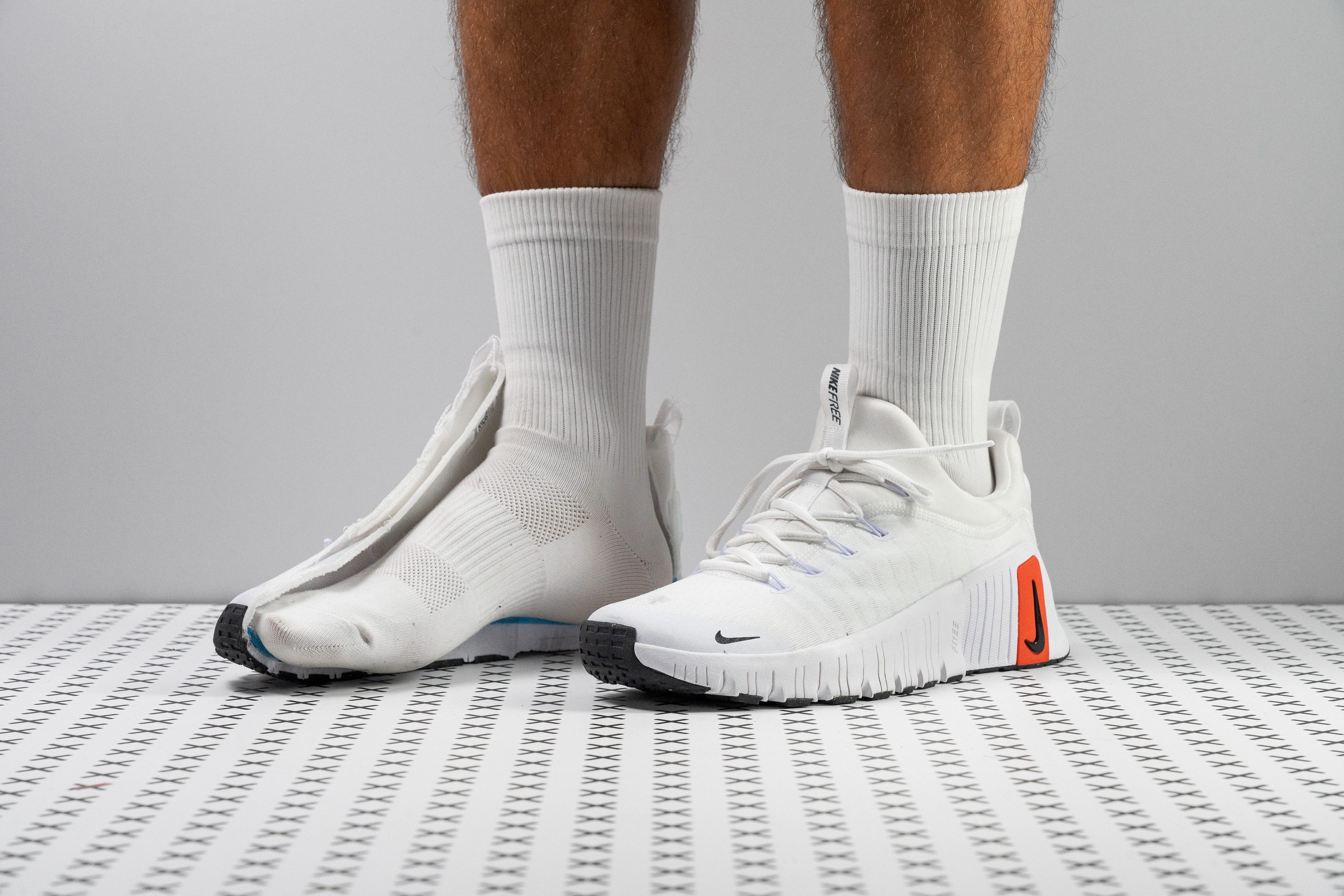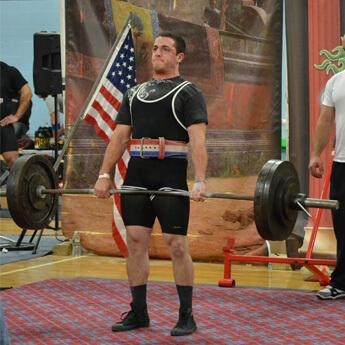Our verdict
- Our top pick in best workout shoes
- Our top pick in best gym shoes
Pros
- Fantastic breathability
- Very light on foot (lighter than average too)
- Better cushioned for HIIT
- Most flexible cross-trainer ever
- Excellent stability for moderate weightlifting
- Sock-like fit in a bootie upper
- Very spacious toebox
- True to size
Cons
- NOT for rope climbs (lacks protection)
- Can be hard to put on (narrow opening)
Audience verdict
- Top 17% most popular training shoes
Comparison
The most similar training shoes compared
+ + Add a shoe | |||||
|---|---|---|---|---|---|
| Audience score | 82 Good! | 89 Great! | 90 Great! | 83 Good! | |
| Price | $120 | $150 | $150 | $150 | |
| Use | WorkoutGymHIITJumping rope | WorkoutGymHIITJumping rope | WorkoutGymHIITJumping rope | CrossfitWorkoutCross-trainingGymHIITJumping rope | |
| Drop lab | 7.2 mm | 9.2 mm | 8.5 mm | 7.7 mm | |
| Heel stack lab | 22.0 mm | 25.5 mm | 23.2 mm | 22.9 mm | |
| Forefoot | 14.8 mm | 16.3 mm | 14.7 mm | 15.2 mm | |
| Weight lab | 9.7 oz / 274g | 8.7 oz / 248g | 8.7 oz / 247g | 12.1 oz / 342g | |
| Lightweight | ✓ | ✓ | ✓ | ✗ | |
| Breathability | Breathable | Breathable | Breathable | Breathable | |
| Toebox width at the widest part | Wide | Medium | Medium | Medium | |
| Toebox width at the big toe | Medium | Medium | Medium | Medium | |
| Midsole softness | Balanced | Firm | Firm | Balanced | |
| Stiffness | Flexible | Flexible | Flexible | Flexible | |
| Torsional rigidity | Flexible | Moderate | Flexible | Flexible | |
| Heel counter stiffness | Moderate | Moderate | Flexible | Moderate | |
| Toebox durability | Decent | Bad | Decent | Bad | |
| Heel padding durability | Good | Bad | Decent | Decent | |
| Outsole durability | Good | Decent | Good | - | |
| Midsole width in the forefoot | Wide | Average | Average | Average | |
| Midsole width in the heel | Wide | Average | Wide | Average | |
| Widths available | Normal | Normal | Normal | Normal | |
| Insole thickness | Average | Very thick | Average | ||
| Outsole thickness | Average | Average | Average | Thick | |
| Outsole hardness | Average | Average | Average | Average | |
| Heel tab | Finger loop | None | None | None | |
| Tongue: gusset type | Bootie | Both sides (full) | Both sides (semi) | Both sides (full) | |
| Tongue padding | Average | Average | Very thin | Very thin | |
| Ranking | #26 Bottom 16% | #10 Top 33% | #7 Top 23% | #21 Bottom 32% | |
| Popularity | #5 Top 17% | #2 Top 7% | #20 Bottom 35% | #8 Top 26% |
Who should buy
We struggle to think of a cross-trainer that's just as good as the Nike Free Metcon 6 if you are looking for the following:
- a super flexible HIIT shoe to accommodate planks, burpees, sled pushes, lunges, etc.
- an airy trainer that feels barely there thanks to its lightness and breathability
- a cross-trainer with enough stability for lifting up to 350 lbs (160 kg)
- a training shoe with plenty of toe space for wide feet and comfortable toe splay
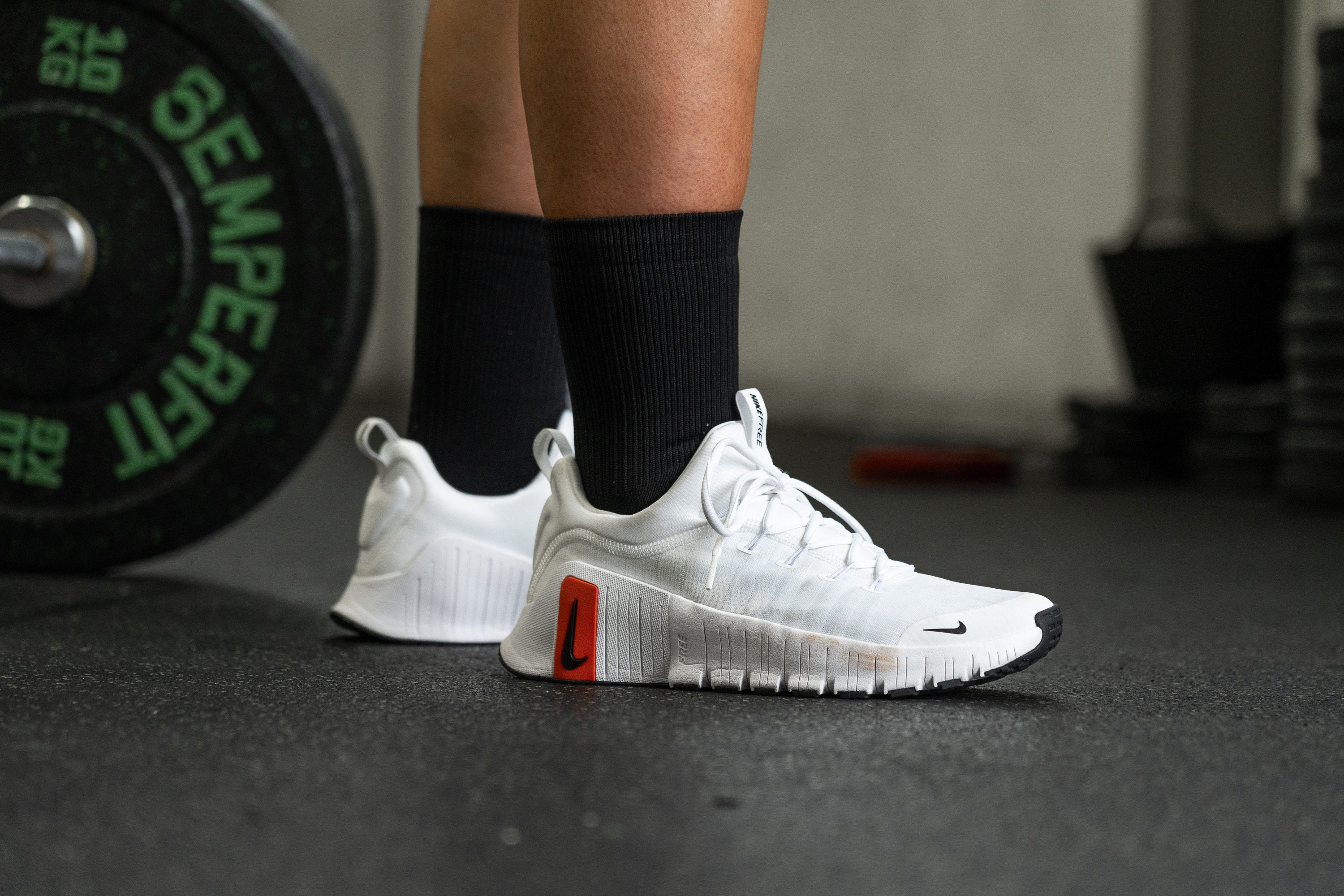
Who should NOT buy
We didn't find any serious flaws in the Nike Free Metcon 6 but it may not be the best match if the following scenarios are involved:
- Olympic weightlifting or maxing out 400+ lbs (180+ kg)
- Rope climbing (the upper and midsole with tear instantly)
If that's part of your training plan, then the Nike Metcon 9 is a must!
Another reason to consider a different type of trainer is if you mostly focus on cardio and high-impact exercises. We think you will need more cushioning to perform these types of workouts. Consider shoes like the Nike Air Zoom TR 1 or even the Nike Zoom SuperRep 4 for extra responsive Zoom Air units.
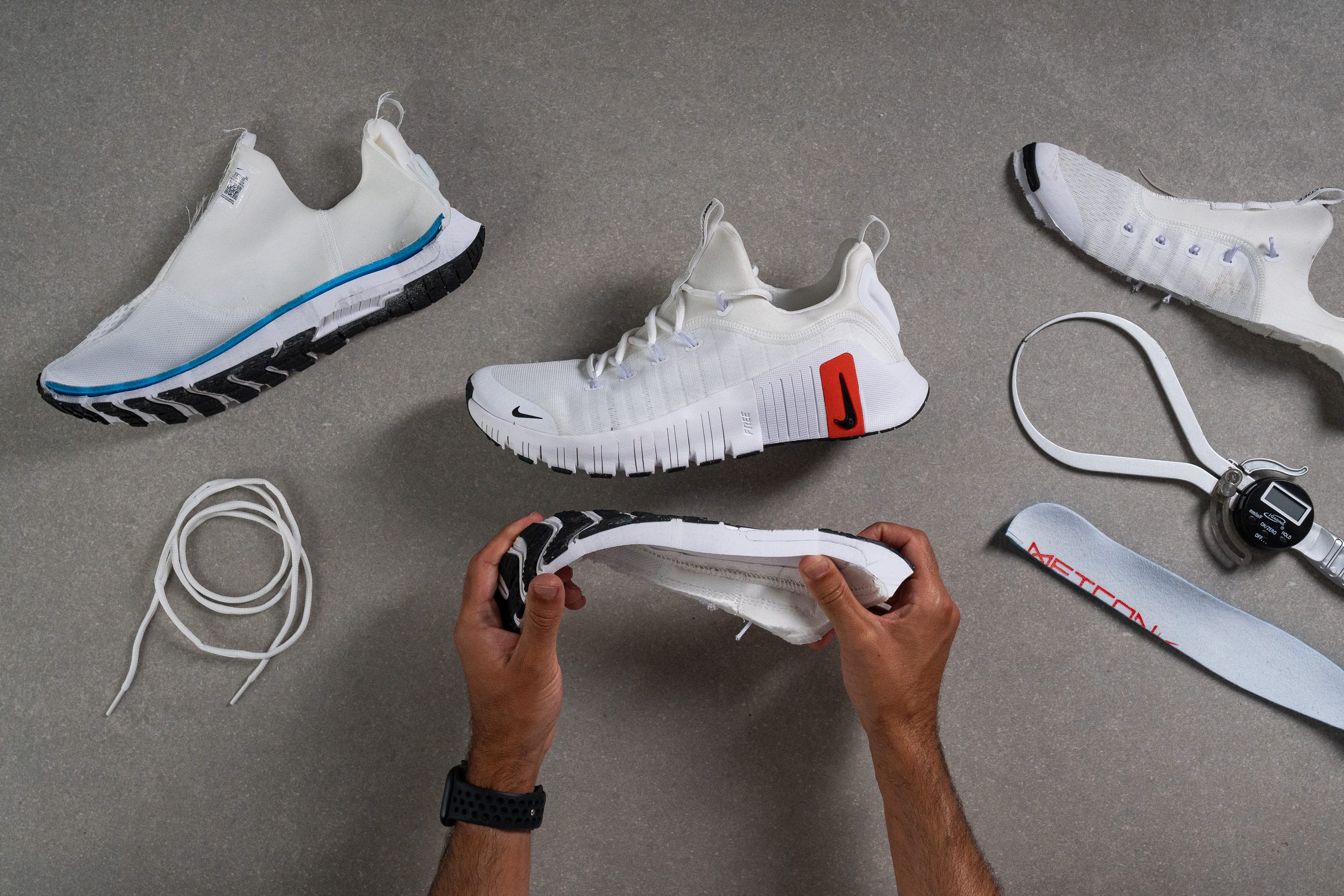
Breathability
Having lab-tested dozens of cross-training shoes, we have been disappointed with the lack of breathability in this footwear category. In contrast, the Nike Free Metcon 6 feels like a breath of fresh air!
Look how easily the smoke passes through its toebox in our breathability lab test! This is exactly what your hot and sweaty feet want to experience during a grueling workout. A 5 out of 5 breathability!
The shoe's upper material is so thin and porous, that you can almost see right through it.
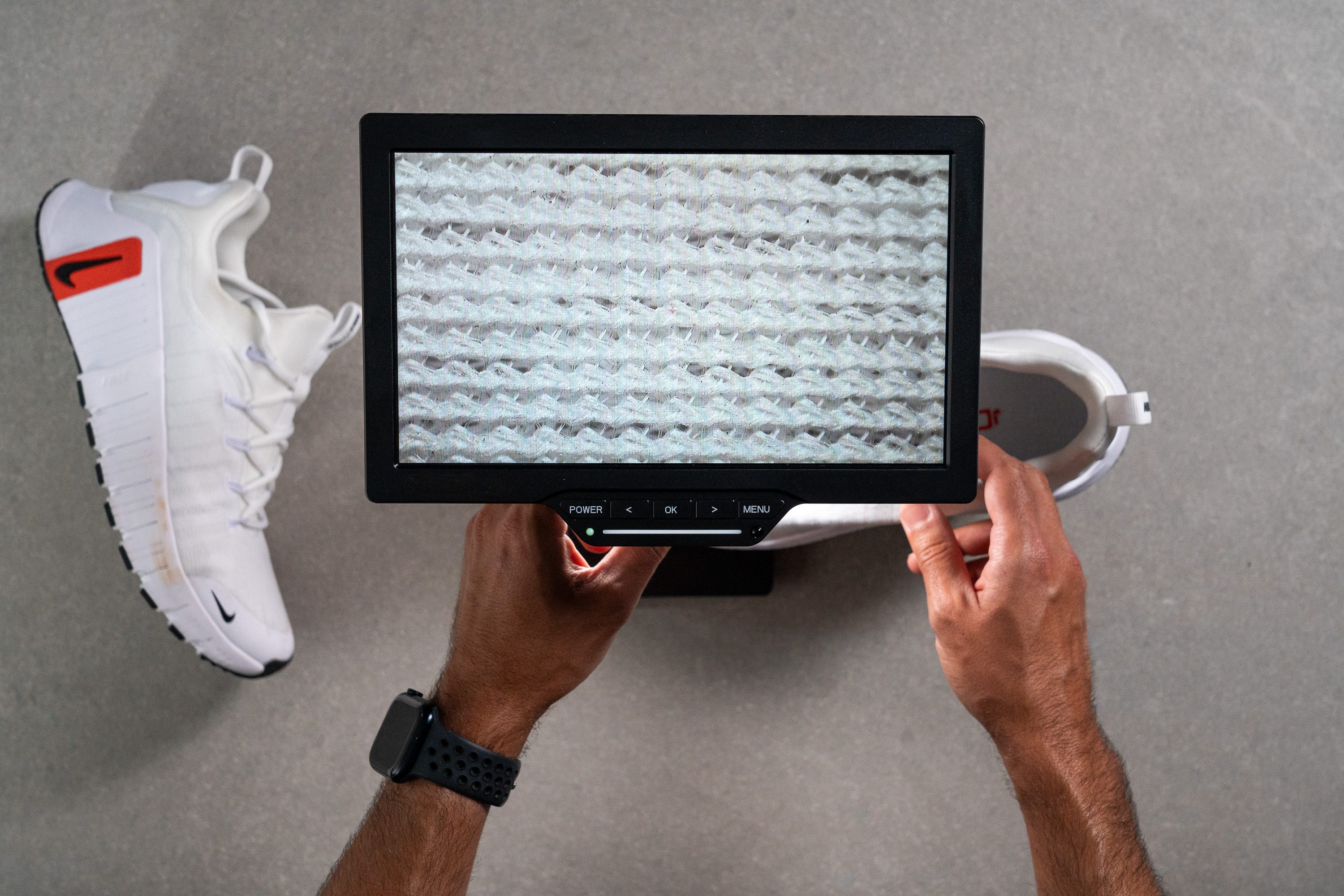
In an up-close look through our microscope, we discovered that Nike fuses thinner and thicker threads to keep the fabric so light and airy.
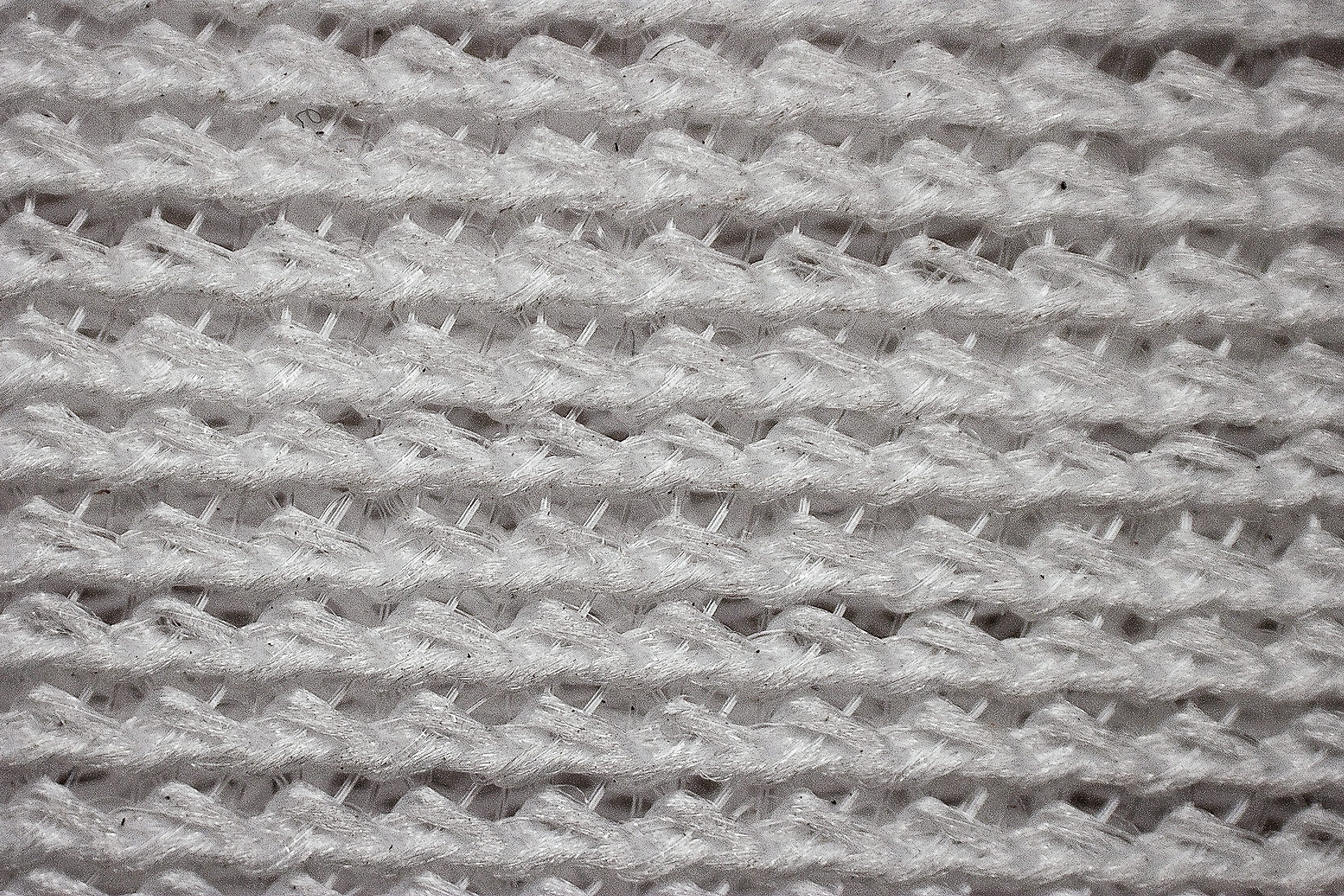
| Free Metcon 6 | 5 |
| Average | 3.4 |
Durability
Toebox durability
On the downside, the delicate mesh of the Free Metcon 6 doesn't bode well with slashes and brushes against abrasive surfaces. For example, rope climbing is a HUGE no-no for this Nike trainer.
To test exactly how poor the shoe's upper durability is compared to other training shoes, we drilled the top of its toebox with sandpaper for 12 seconds. For consistent results, we keep the Dremel speed (5K RPM) and pressure (3.2N) the same for all tested shoes.
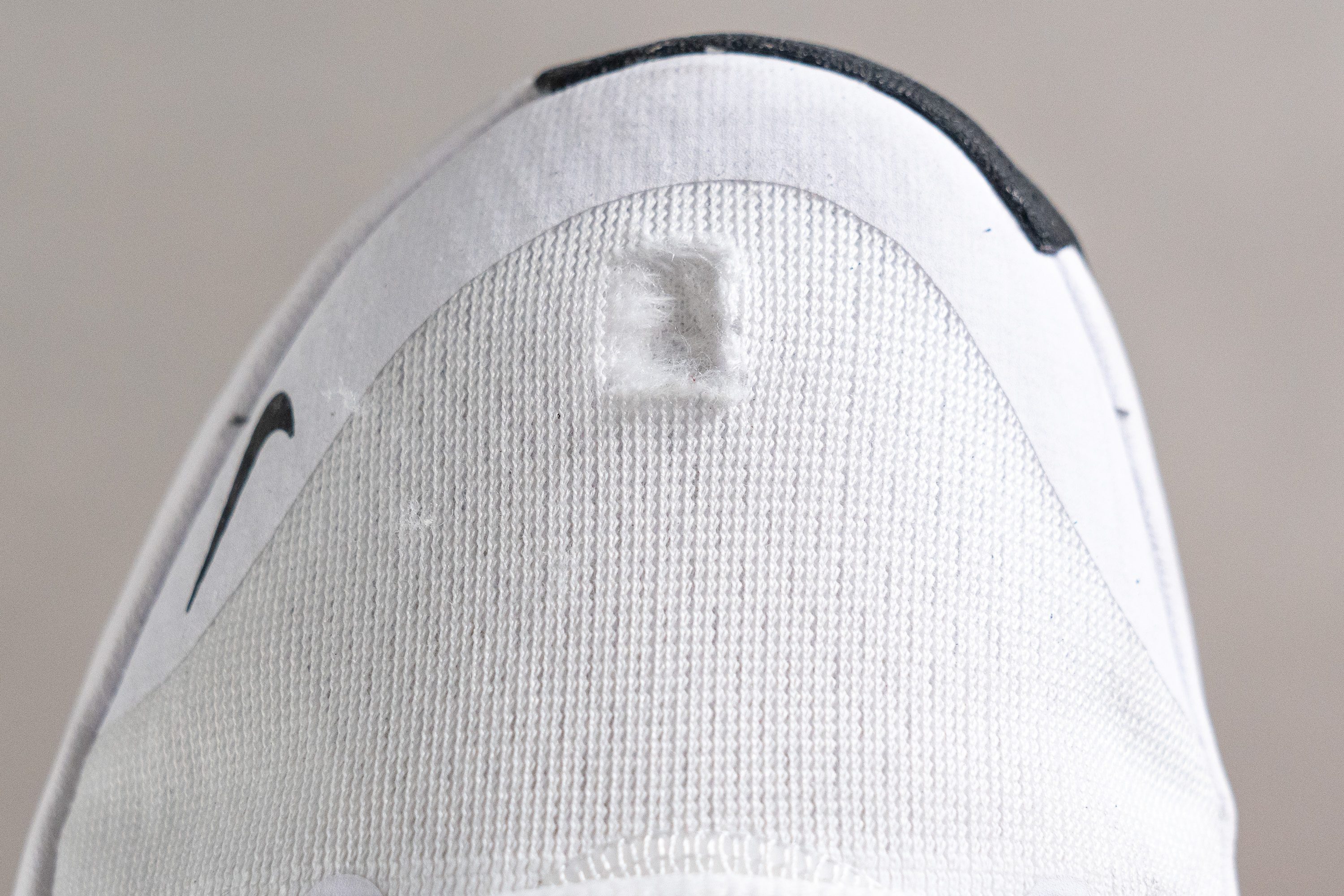
And the test results speak for themselves. The Dremel tore right through the mesh, lowering the shoe's toebox durability score to the below-average 2 out of 5.
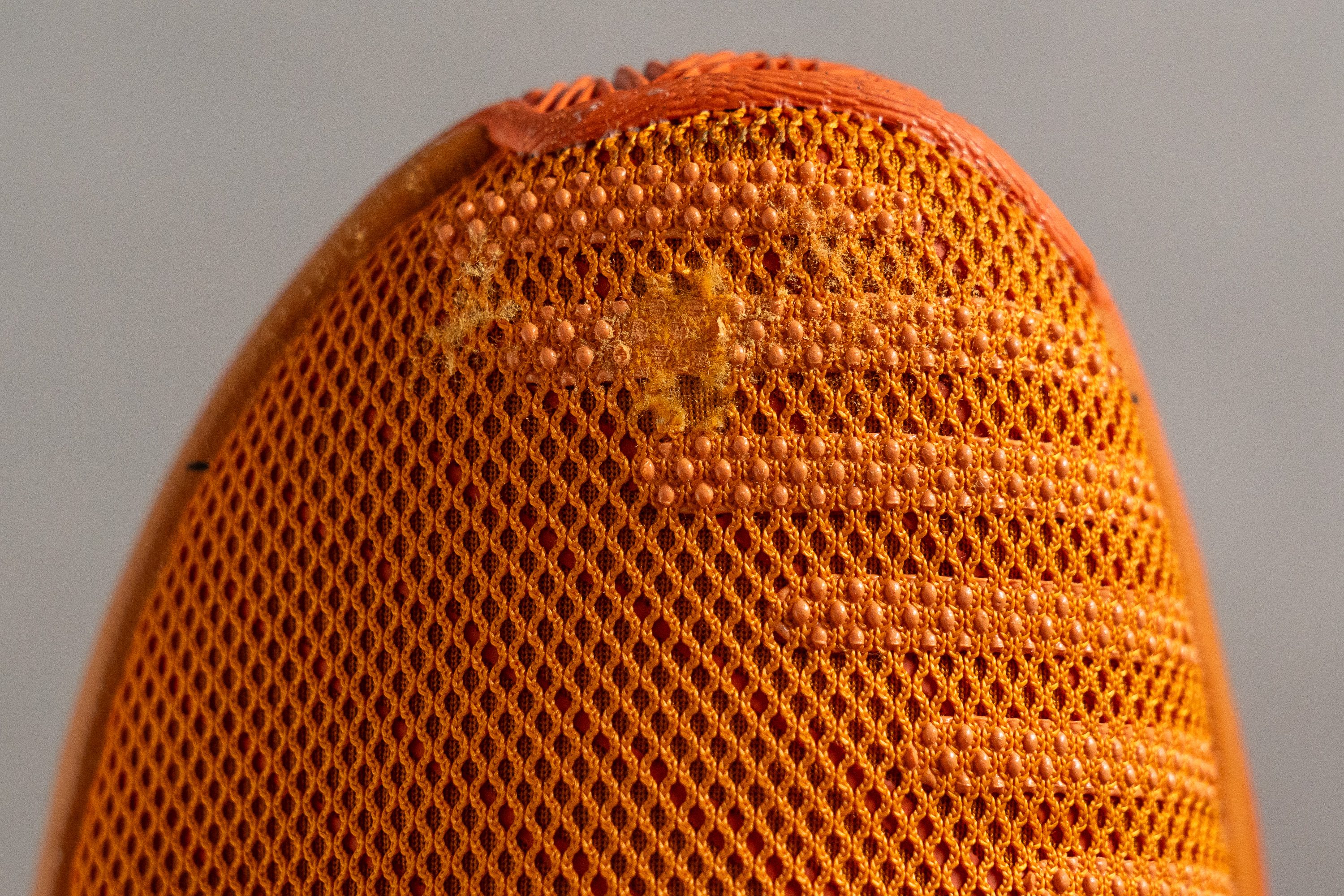
For reference, the Nike Metcon 9 earned a higher score (3 out of 5) thanks to the added TPU dots.
| Free Metcon 6 | 2 |
| Average | 2.6 |
Heel padding durability
Considering the fast-paced nature of HIIT workouts, it's not just the exterior part of the shoe that is prone to wear and tear - the shoe's inner lining sustains a great deal of abrasion too.
Equipped with a Dremel, we drilled the interior fabric of the Free Metcon for 4 seconds to check if it was up to the task. And it didn't disappoint!
Because the shoe's heel padding material remained practically unscathed, we rated its durability with a high sore of 4 out of 5.
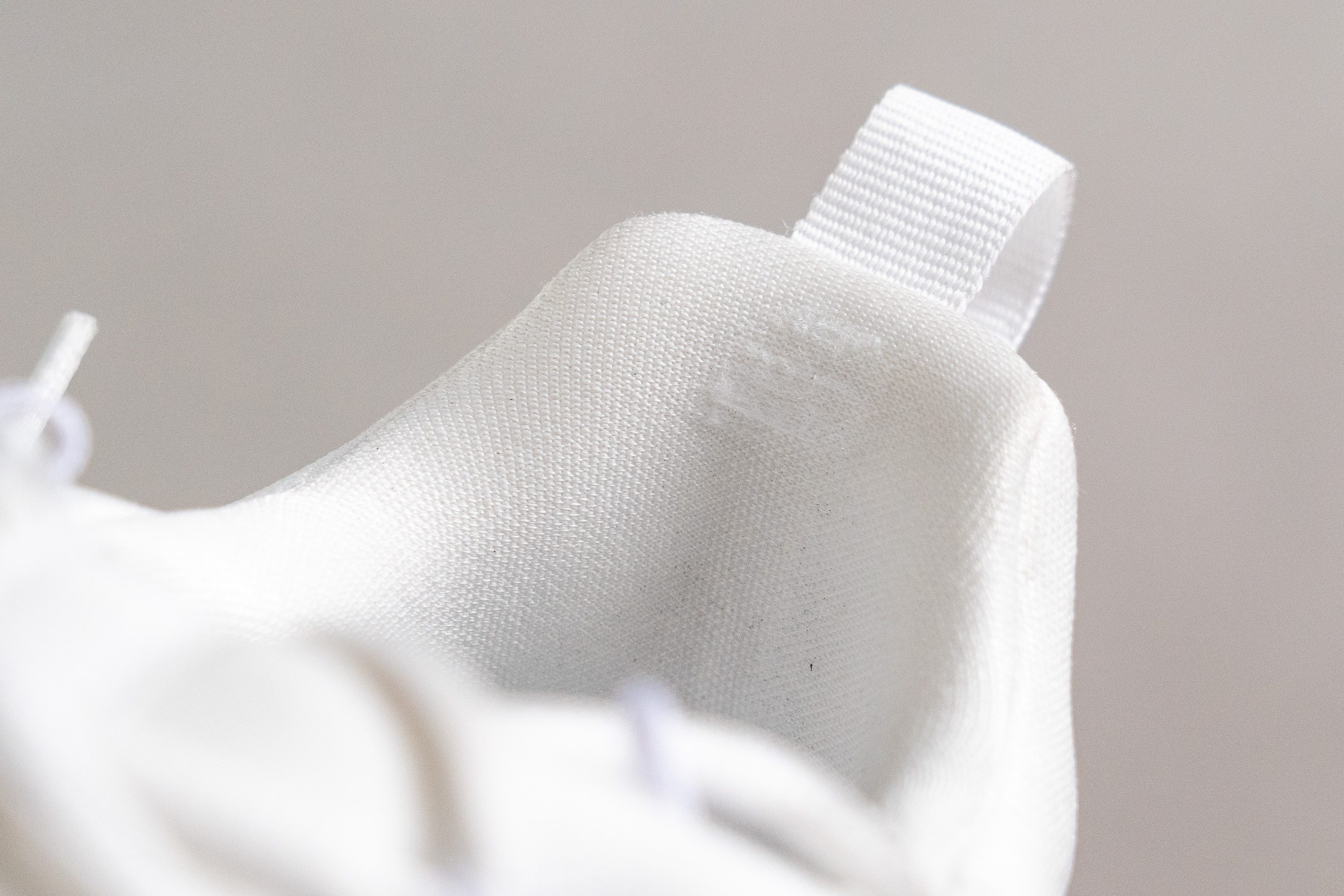
| Free Metcon 6 | 4 |
| Average | 2.7 |
Outsole hardness
Compared to the previous Free Metcon iterations, the 6th version uses more rubber on the outsole. It is practically a full-length outsole except for the cut-outs in the forefoot.
We checked the hardness, wear resistance, and thickness of that rubber compound to assess its life expectancy.
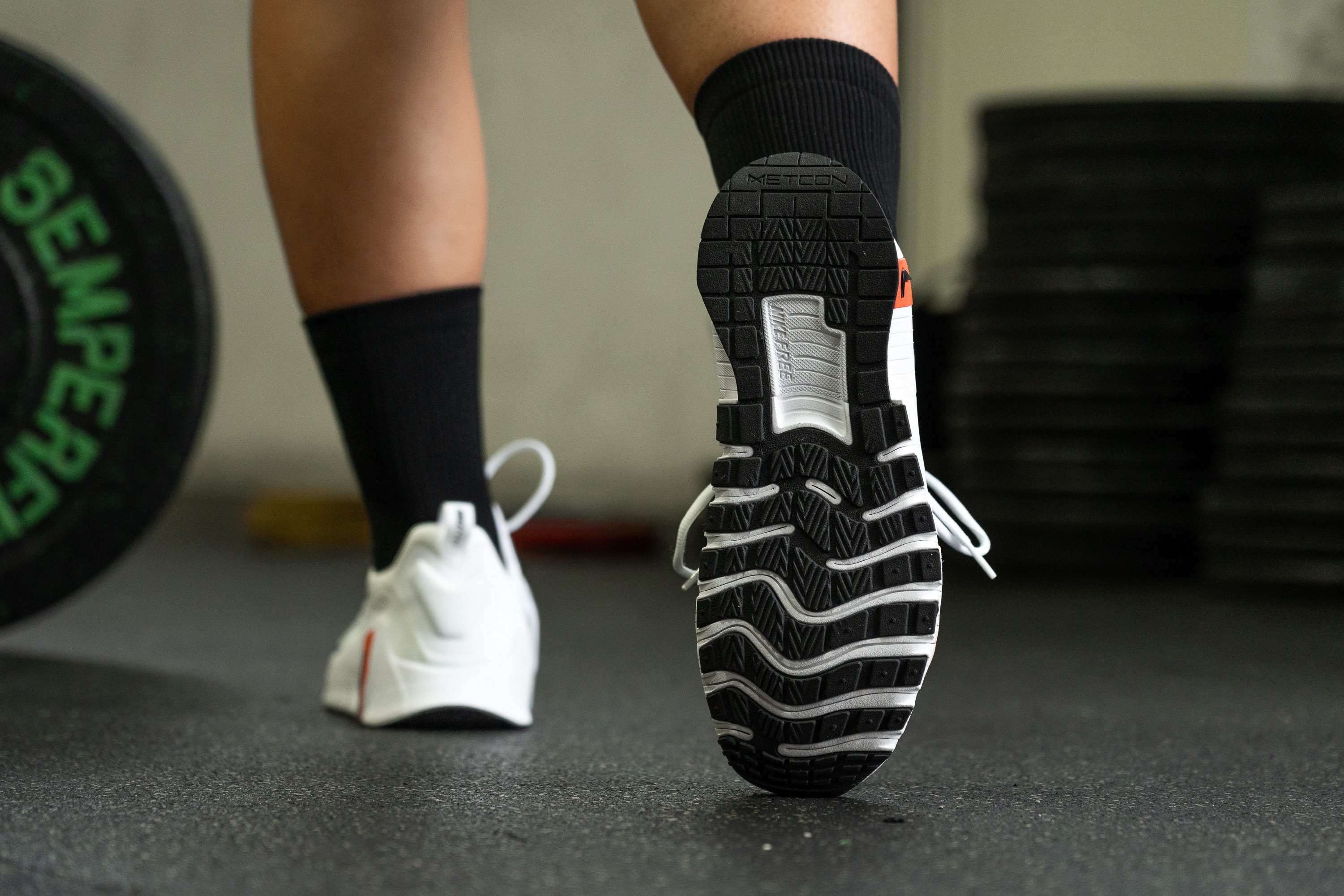
Using a Shore C durometer, we measured the hardness of the rubber at 81.0 HC. Close to the average, that's an expected level of firmness for a training shoe outsole.
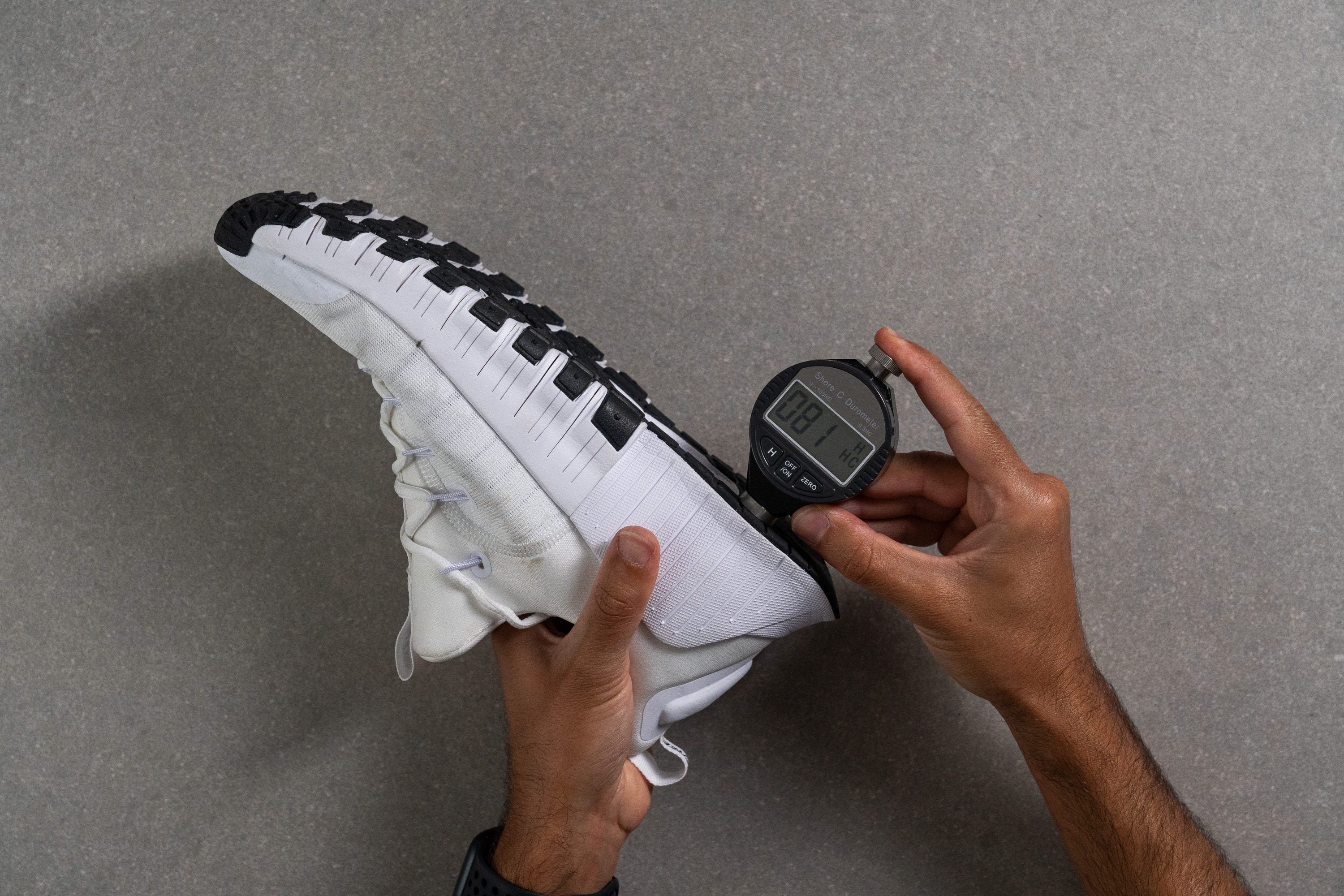
| Free Metcon 6 | 81.0 HC |
| Average | 82.9 HC |
Outsole durability
Next challenge - 22 seconds of sandpaper drilling at a 10K RPM speed. Let's go!
Once again this Nike trainer proved its worth by taking all the abuse from our Dremel with minimal damage!
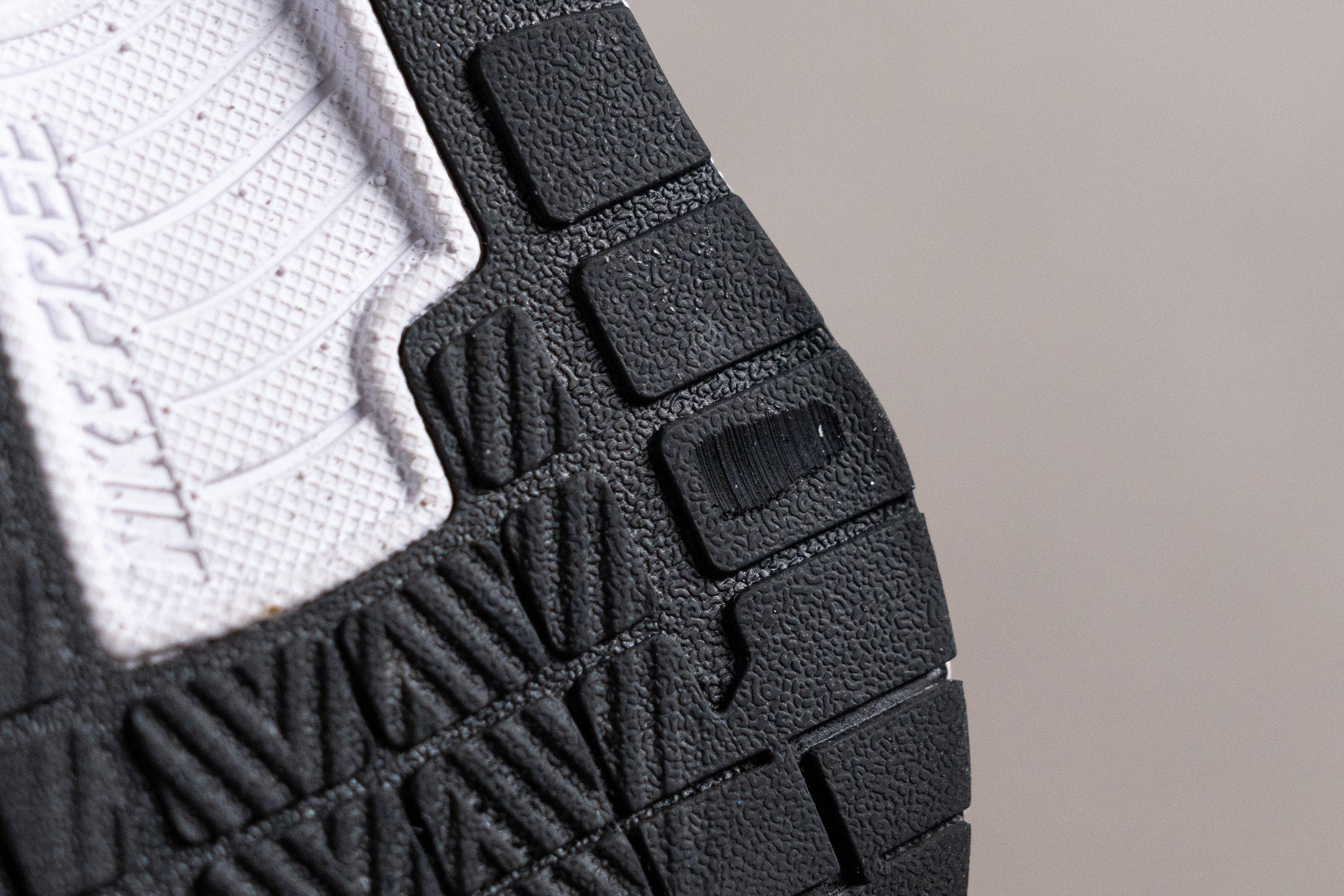
Our tread gauge showed that the dent was as shallow as 0.7 mm - that is smaller than the average!
| Free Metcon 6 | 0.7 mm |
| Average | 1.1 mm |
Outsole thickness
Finally, we recorded the shoe's outsole thickness at 2.6 mm which is about a millimeter thinner than the average.
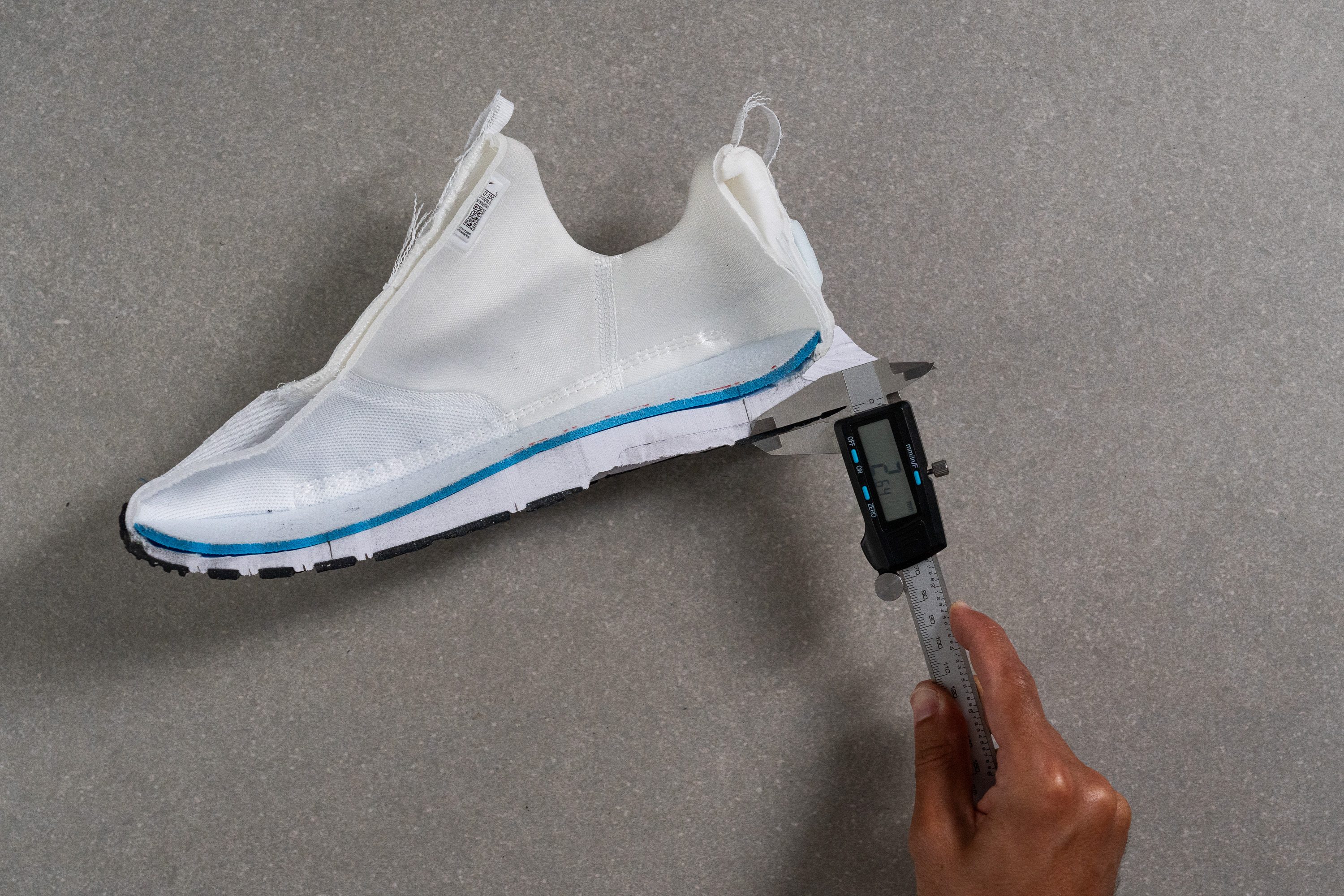
All three measurements considered, we believe that the Nike Free Metcon 6 will make for an exceptionally durable gym shoe.
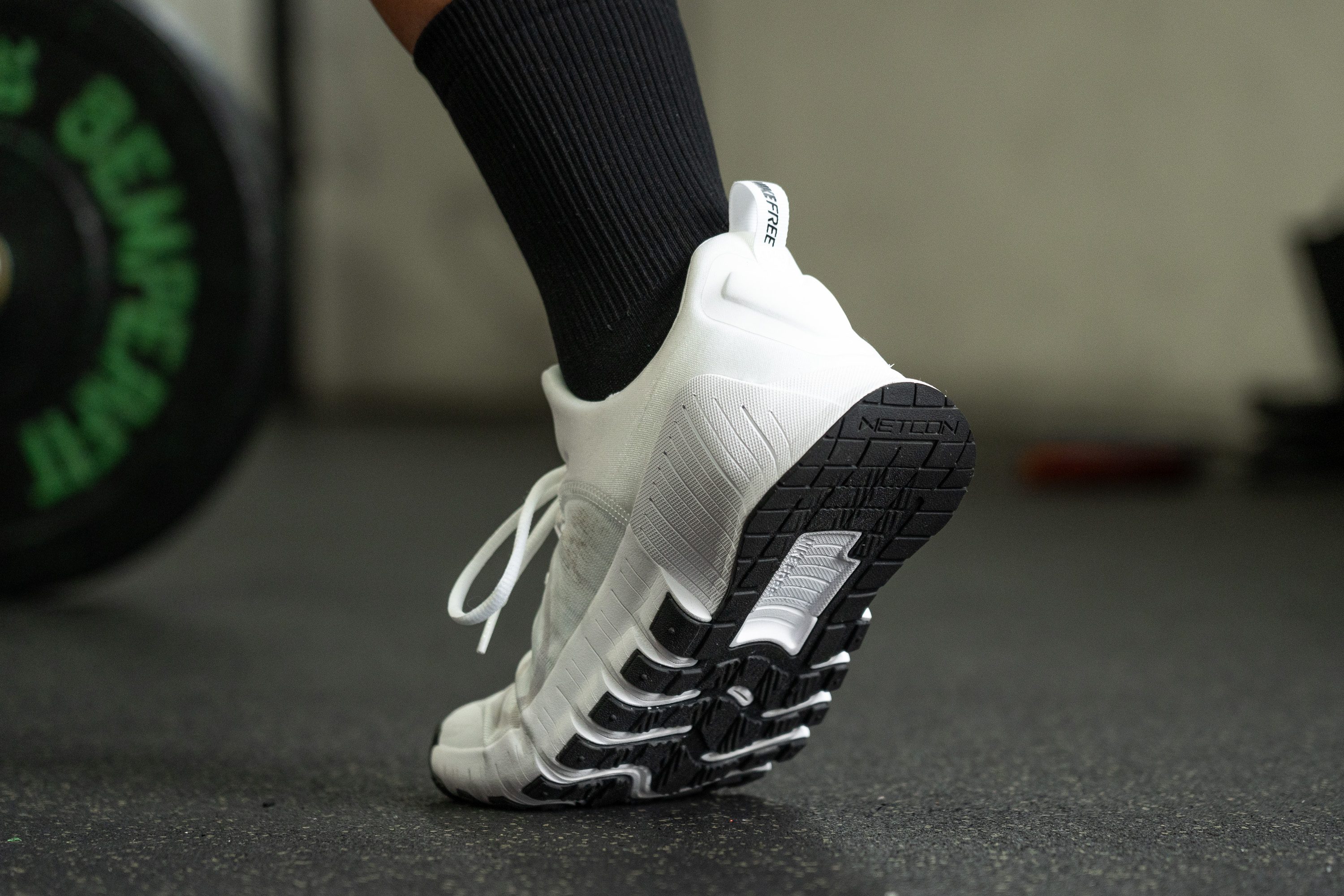
We also think that it is capable of occasional outdoor use but because of the thinner sole and deep cutouts that can catch small pebbles and debris, we wouldn't recommend using it exclusively for outdoor workouts. That's what trainers like the Reebok Nano X3 Adventure are made for.
| Free Metcon 6 | 2.6 mm |
| Average | 3.6 mm |
Weight
We had no complaints about the weight of the previous iteration but Nike made the Free Metcon 6 even lighter!
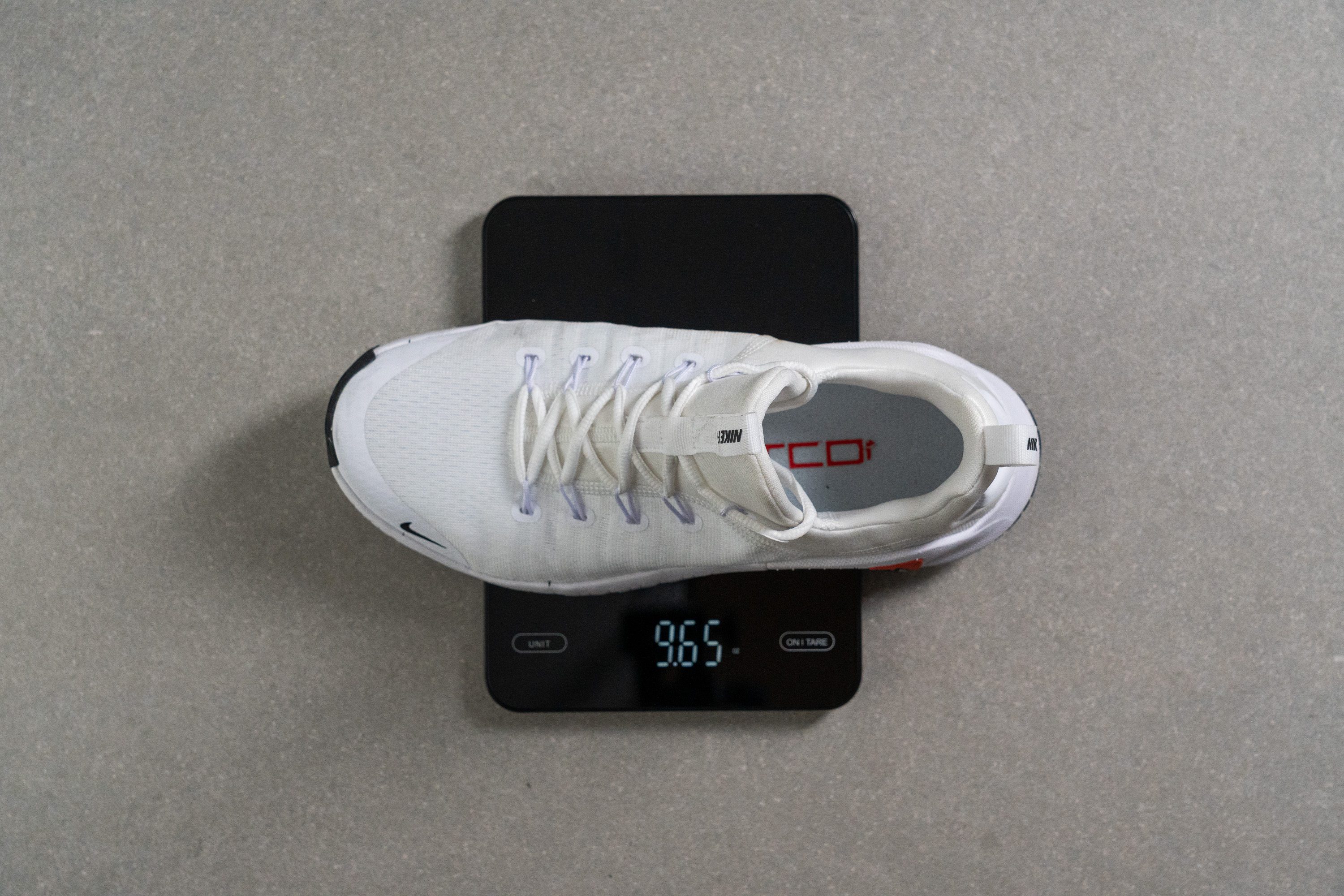
Tipping the scale at 9.7 oz (274g) in a men's US size 9, the trainer is 0.8 oz (24g) lighter than the Free Metcon 5 and a whole ounce lighter than the training shoe average.
The Free Metcon 6 felt weightless on our feet which made cardio exercises and short treadmill runs even more enjoyable.
| Free Metcon 6 | 9.67 oz (274g) |
| Average | 10.76 oz (305g) |
Cushioning
Heel stack
The brand reconfigured cushioning for the Free Metcon 6 and its heel stack of 22.0 mm ended up a couple of millimeters lower than the v5.
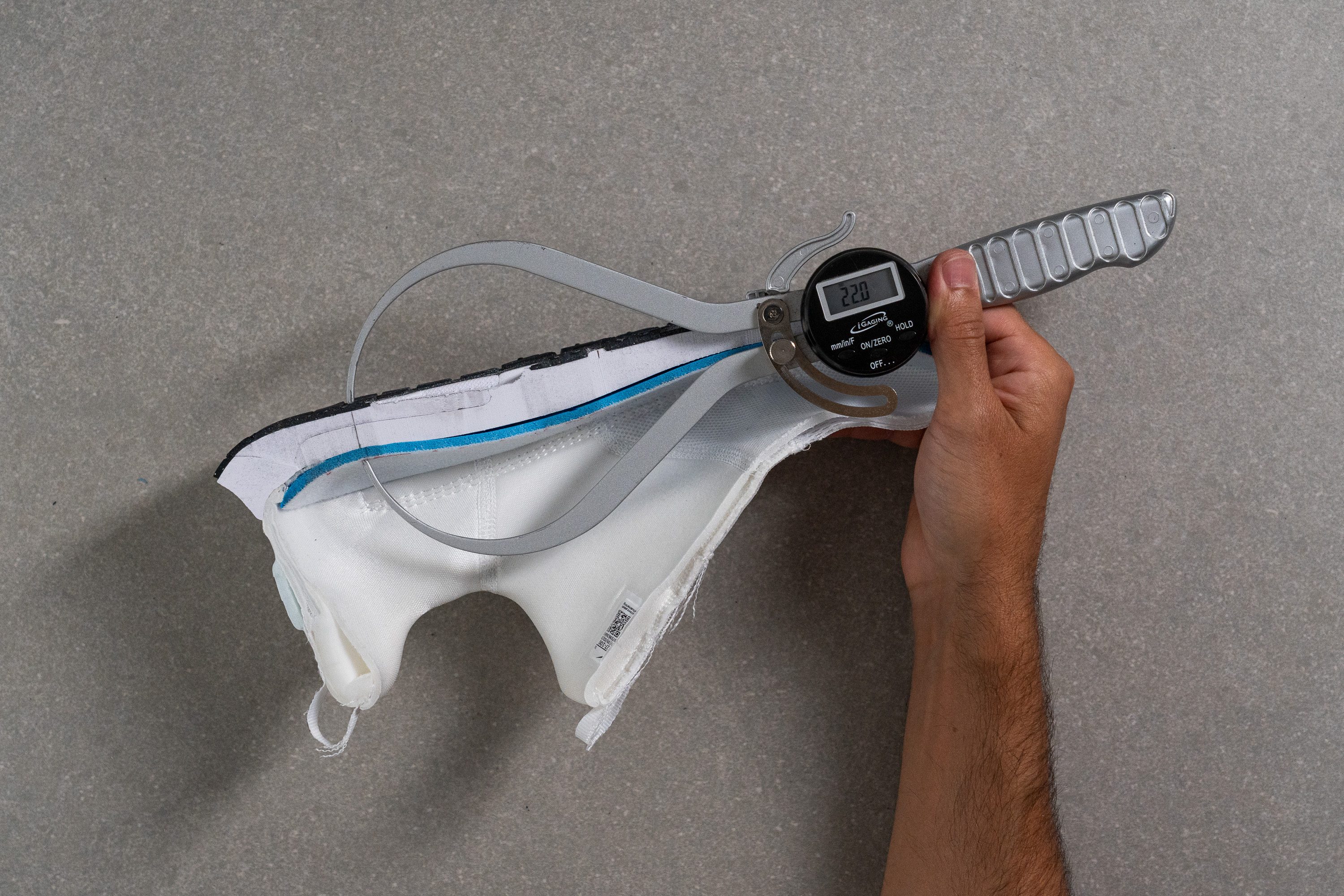
However, we found that the shoe still offers a perfect balance of impact protection and ground contact. It doesn't feel any different from a typical cross-trainer.
| Free Metcon 6 | 22.0 mm |
| Average | 24.4 mm |
Forefoot stack
The forefoot, on the other hand, got 3 mm lower compared to the v5. With a low stack of 14.8 mm, Free Metcon 6 got more grounded and flexible in this area.
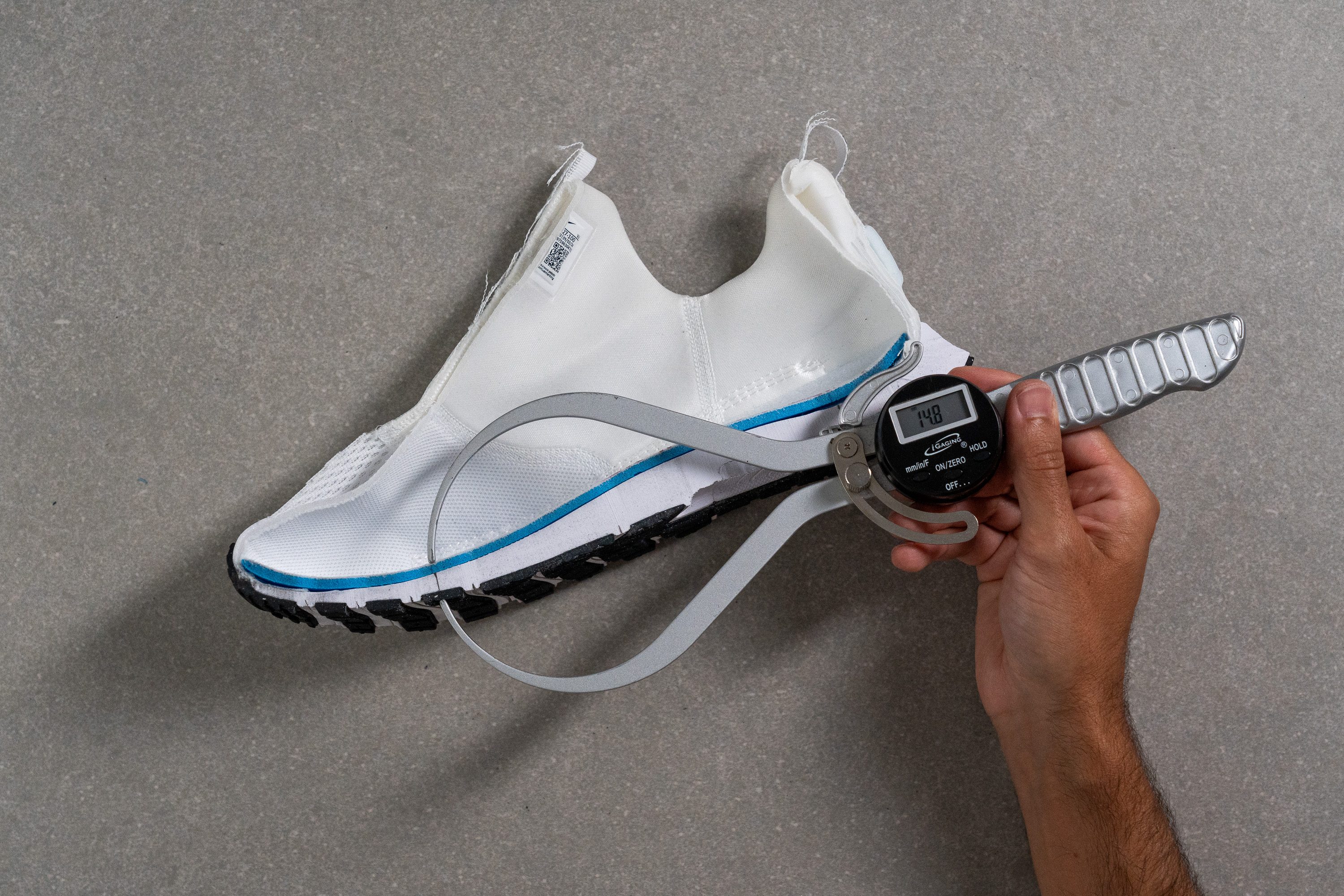
| Free Metcon 6 | 14.8 mm |
| Average | 18.2 mm |
Drop
Looking at the difference in stack heights, we got a heel-to-toe drop of 7.2 mm. It's less than a millimeter away from the v5 (6.4 mm) and is within the industry average.
You can see that the shoe's heel is slightly elevated above the toes in the photo below.
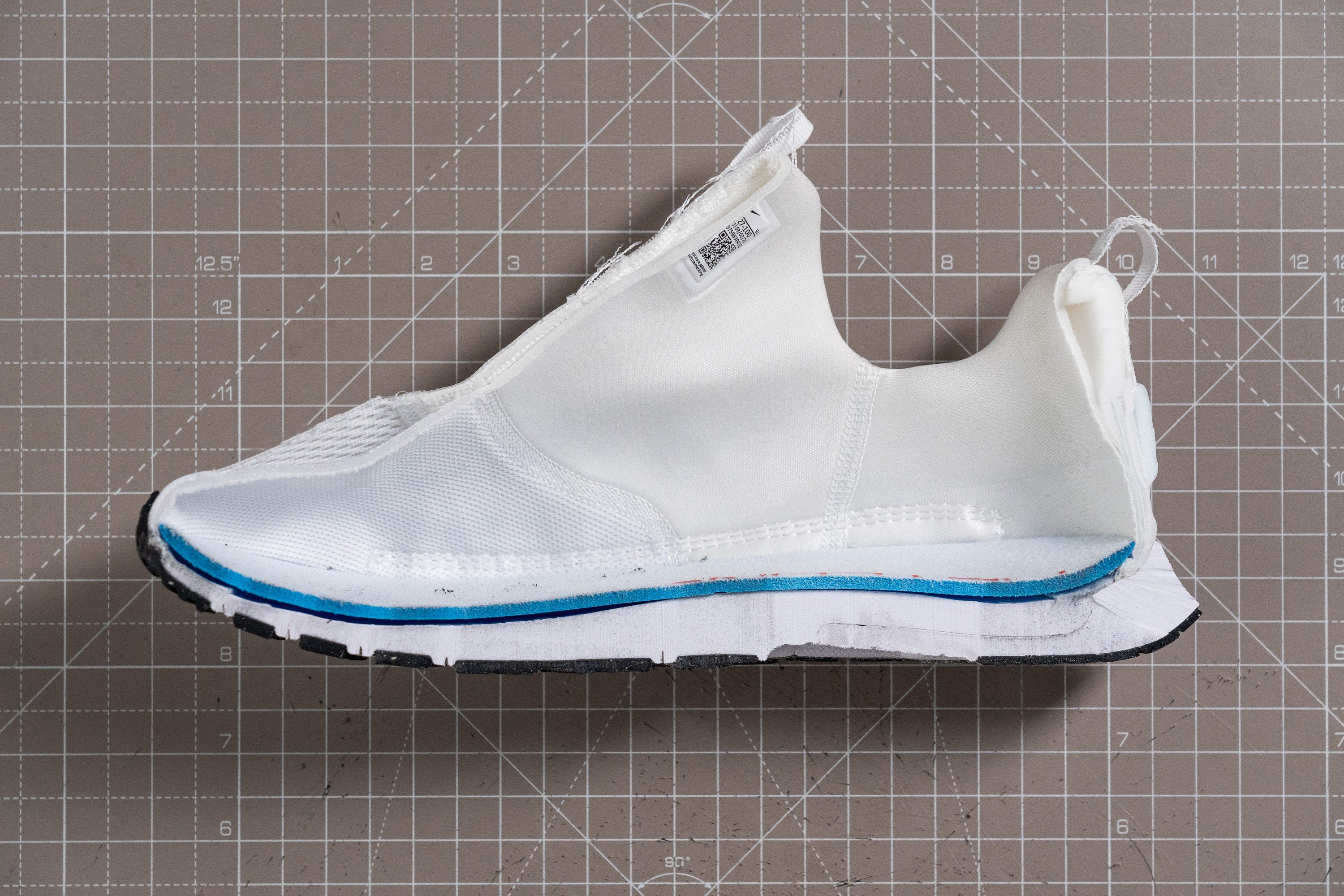
This setup adds comfort by minimizing the strain on the Achilles but doesn't raise the heel too high off the ground to compromise stability.
| Free Metcon 6 | 7.2 mm |
| Average | 6.2 mm |
Midsole softness
Nike chose a different approach to cushioning in the Free Metcon 6.
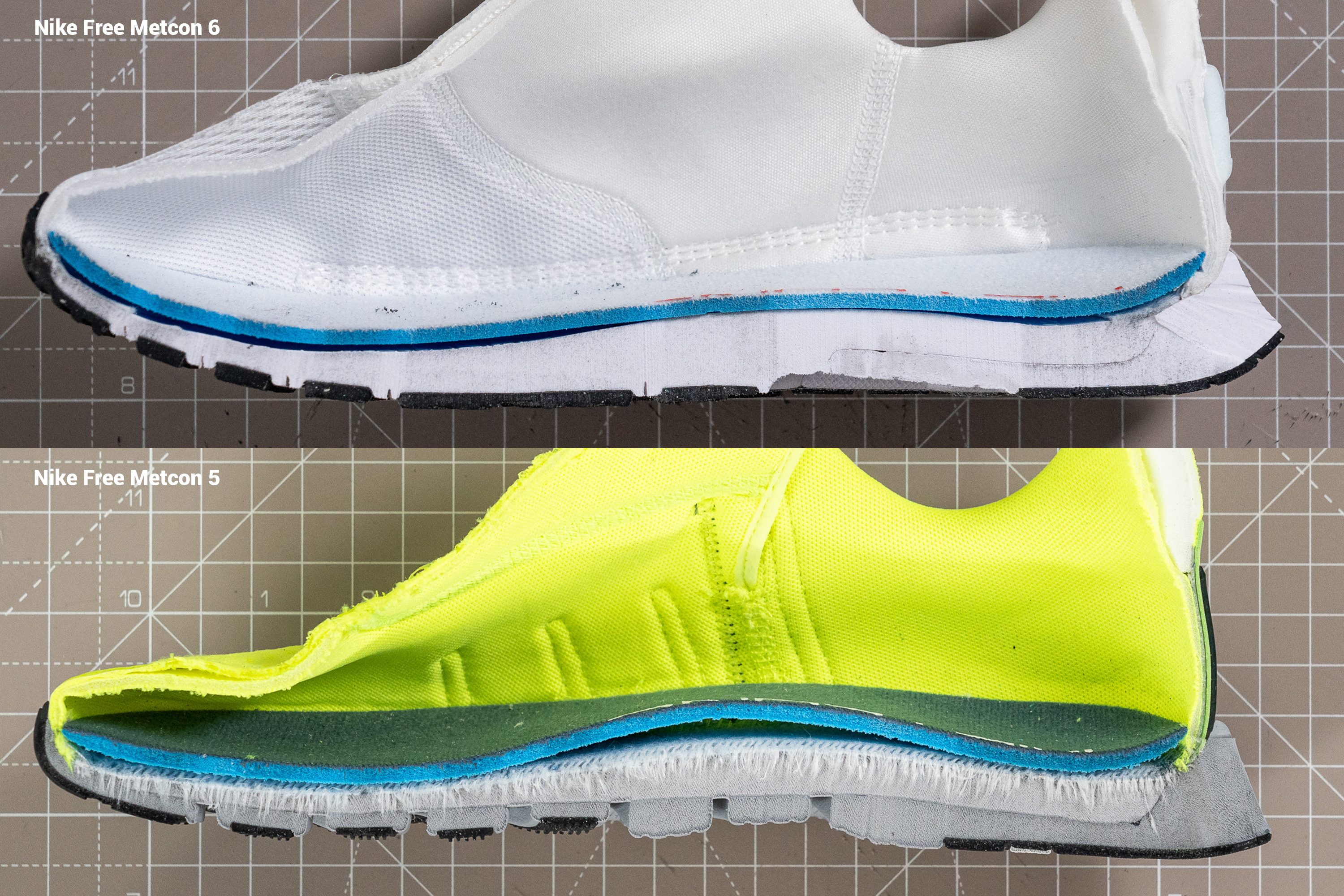
Instead of placing the softer foam on top of the firmer one as it did in the Free Metcon 5, Nike made the firmer foam smaller and kept it only under the heel of the Free Metcon 6.
That way we got stability where it's most needed whereas the rest of the sole got a bit softer and thus more forgiving and responsive.
Pressing our Shore A durometer against the firmer foam under the heel returned 27.8 HA. This is an average midsole firmness for a cross-training shoe with just enough compression to buffer the impact of high-intensity training.
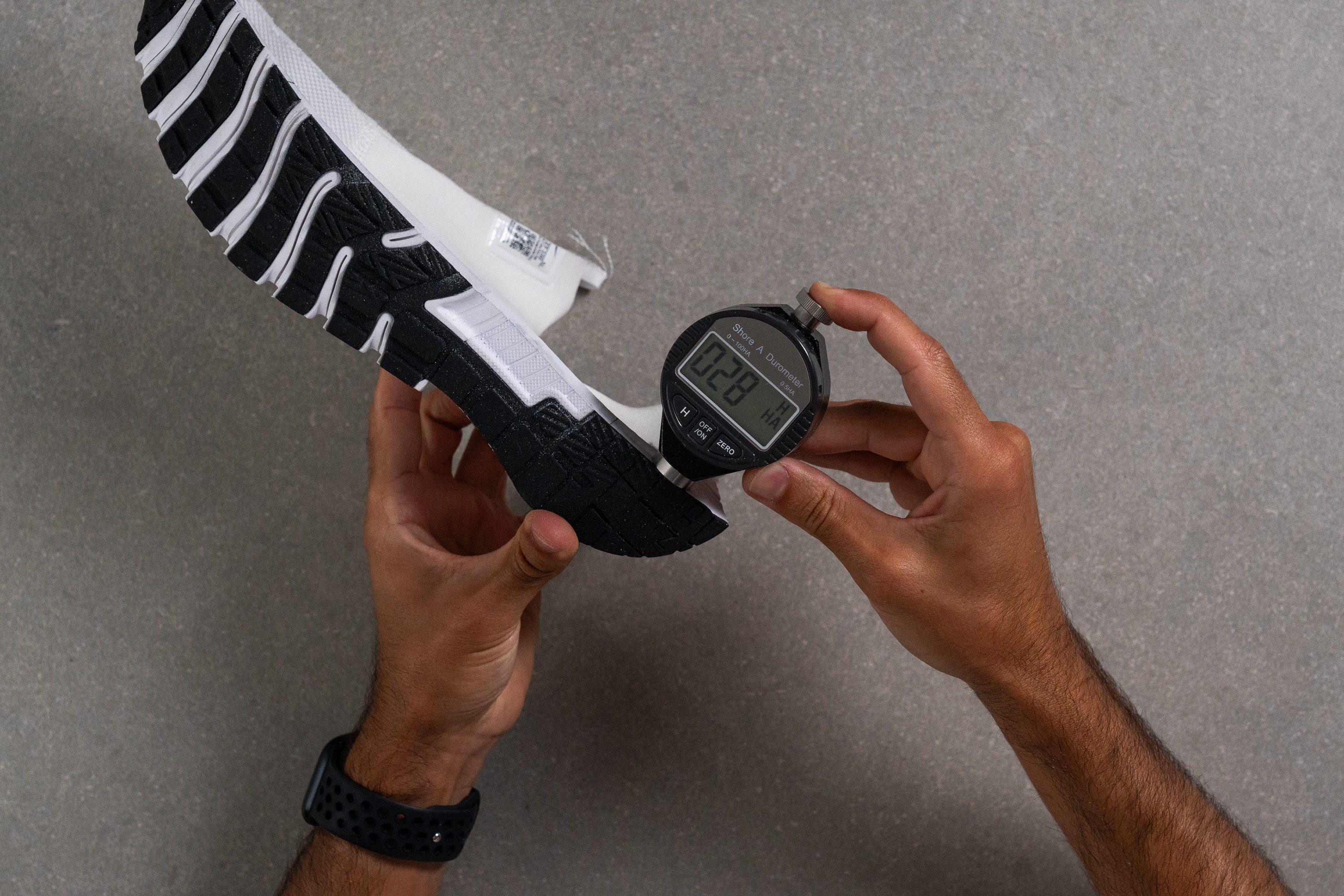
| Free Metcon 6 | 27.8 HA |
| Average | 27.8 HA |
Secondary foam softness
As we already mentioned, the rest of the midsole got notably cushier showing a lower reading of 22.5 HA on our durometer. This is 24% softer than the shoe's firmer foam under the heel.
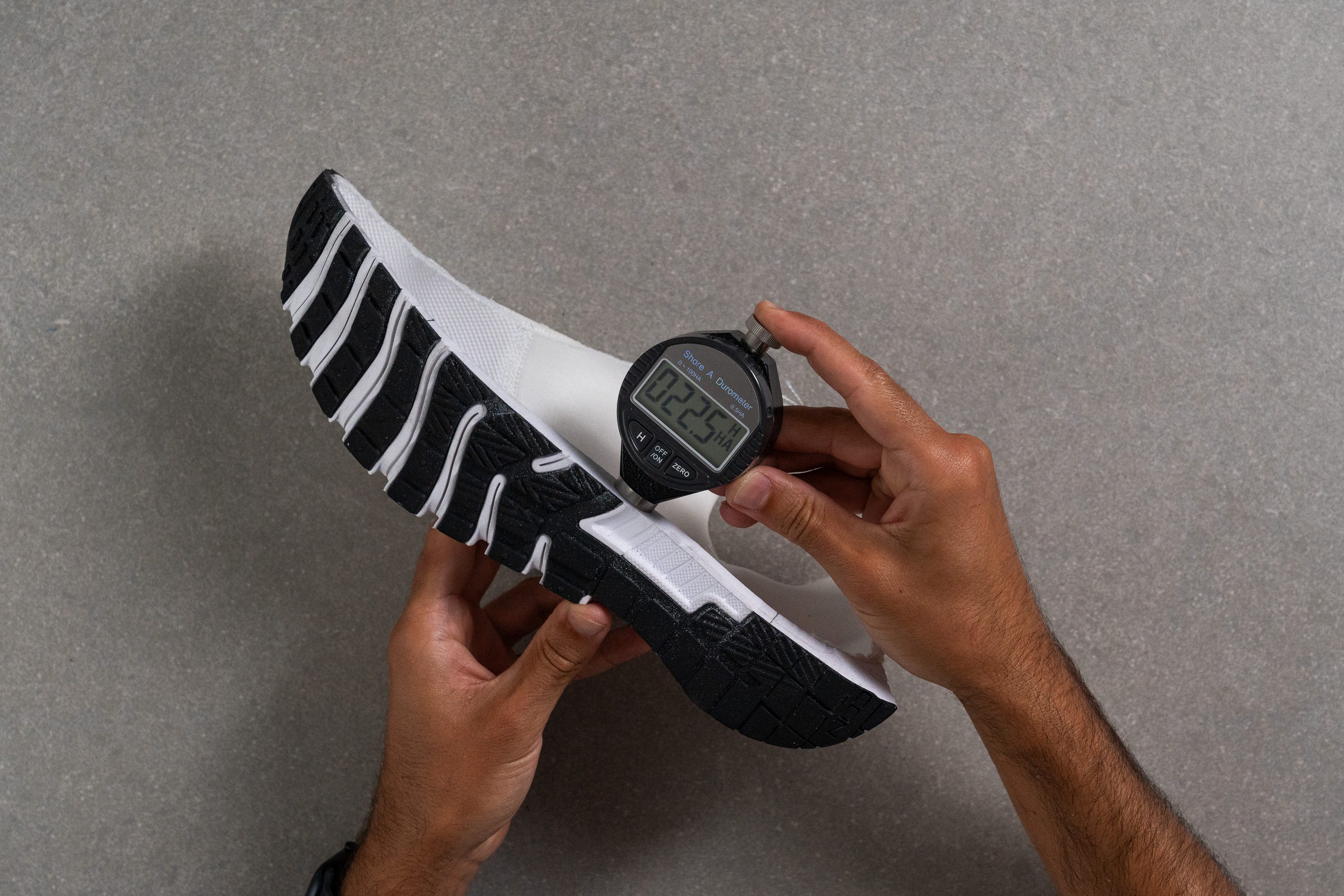
We think that this midsole update enhanced the Free Metcon 6 as a versatile cross-trainer that seamlessly transitions from weightlifting to jumping and other plyometric work.
| Free Metcon 6 | 22.5 HA |
| Average | 32.6 HA |
Insole thickness
A padded insole helped to keep our in-shoe experience comfortable. The caliper showed that it is 4.1 mm thick in the heel.
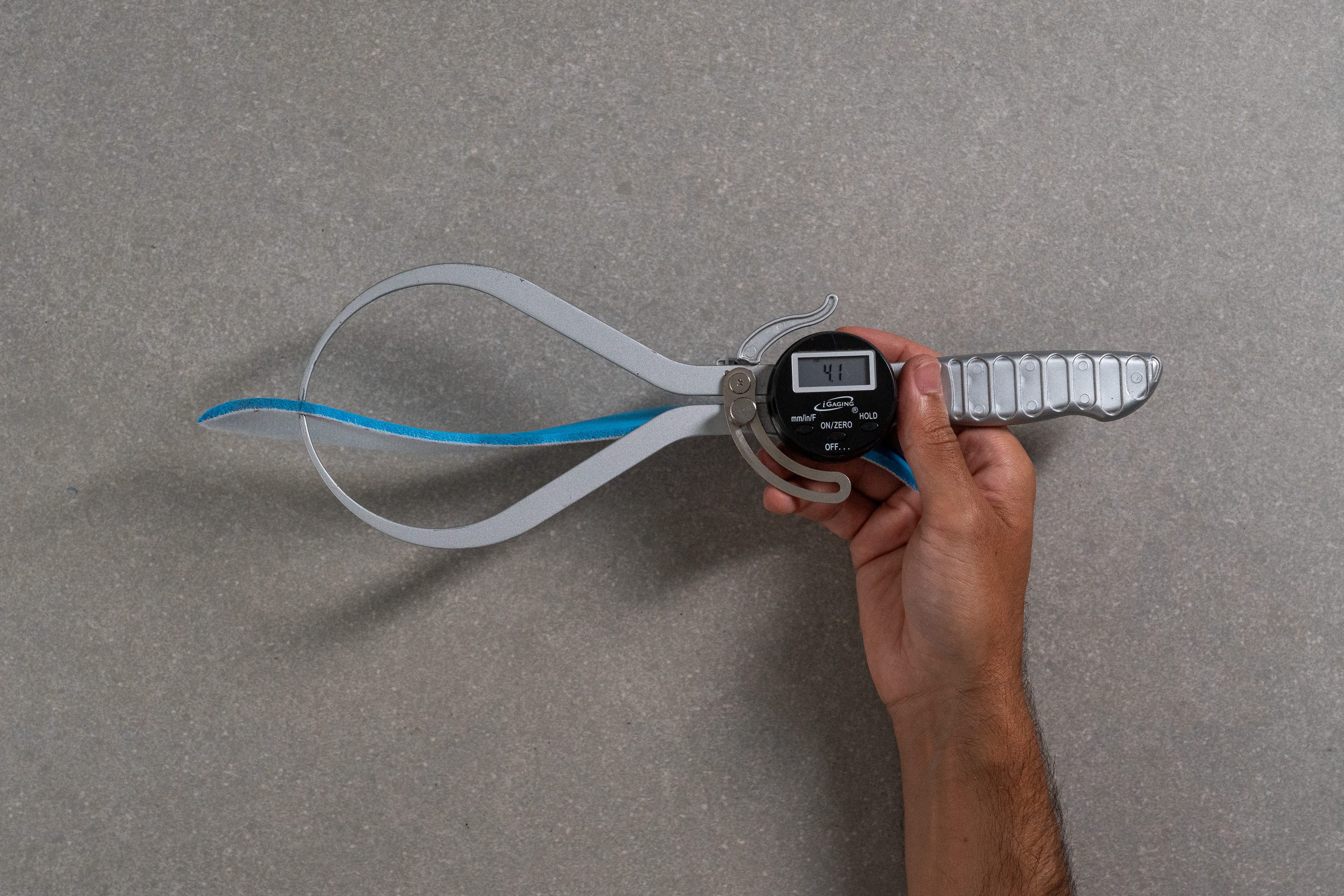
| Free Metcon 6 | 4.1 mm |
| Average | 3.9 mm |
Stability
Lateral stability test
You might think that the Free Metcon 6 got less stable because of the softer foam but that's not the case. The 6th iteration made us feel even more stable than its predecessor!
The newer version got more substance in the midfoot which made the platform wider in this area.
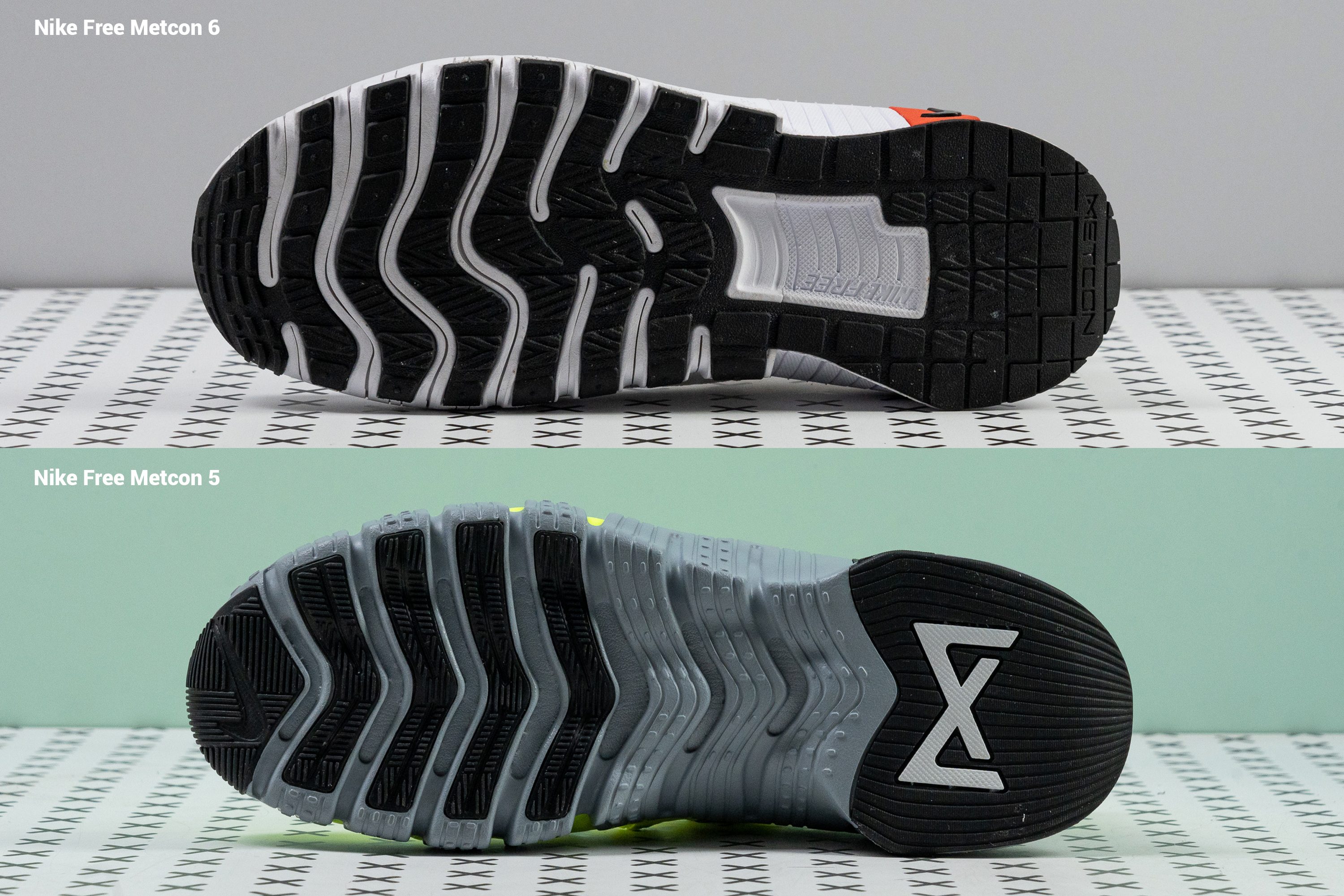
The added foam also closed that odd cavity on the medial side which we had in the v5.
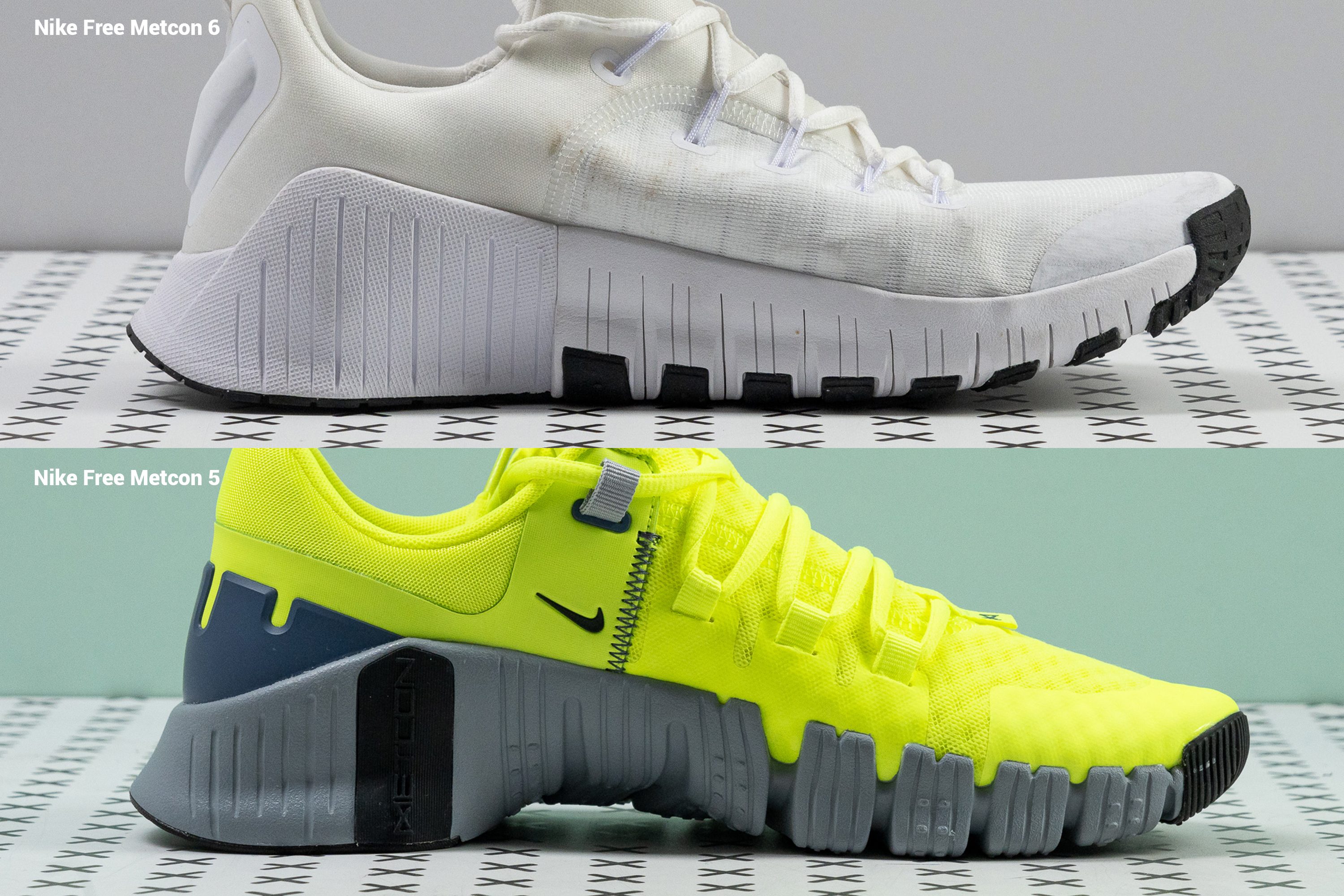
As a result, our feet had a flat and solid contact with the ground in the midfoot which made us feel more connected and in control.
Torsional rigidity
The Free Metcon 6 is a truly unique design because Nike managed to isolate the shoe's stable heel from its ultra-flexible forefoot without compromising either!
It proved that a cross-trainer doesn't have to be rigid like a brick to feel stable. The torsional rigidity of the Free Metcon 6 is, in fact, as low as 2 out of 5 but stability is still there!
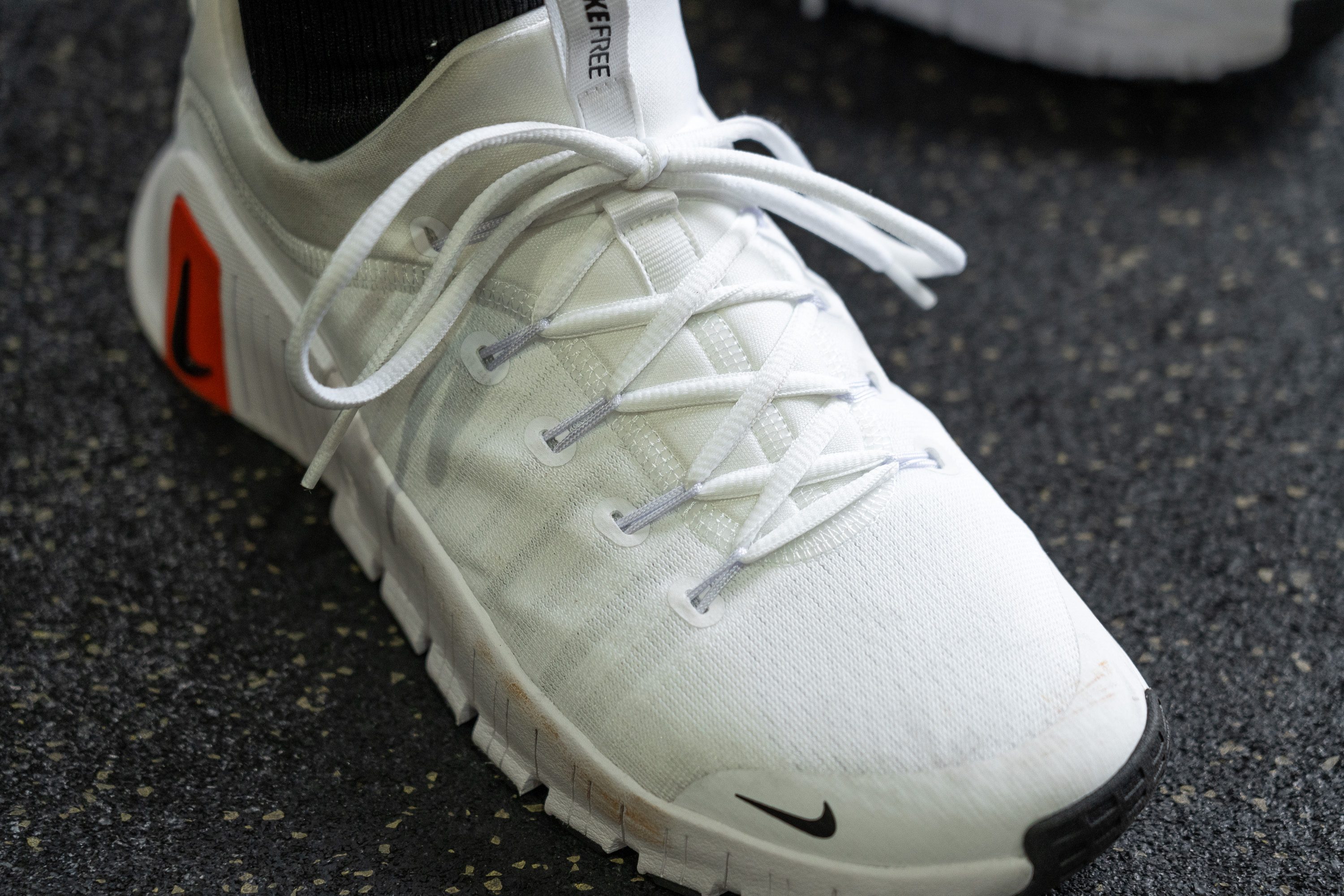
One of the features that enhance the lateral stability of this Nike trainer without adding stiffness to its overall construction are the good old Nike Flywire cables.
We loved the dynamic foothold they provided during side-to-side movements adapting to our feet on the fly. Our only gripe is that they look too flimsy to handle the rigors of HIIT. But luckily, we haven't had any rips so far.
| Free Metcon 6 | 2 |
| Average | 2.7 |
Heel counter stiffness
In the Nike Free Metcon 6, most of the heel support comes not from the heel counter but from the firm oversized sidewalls on both sides of the ankle.
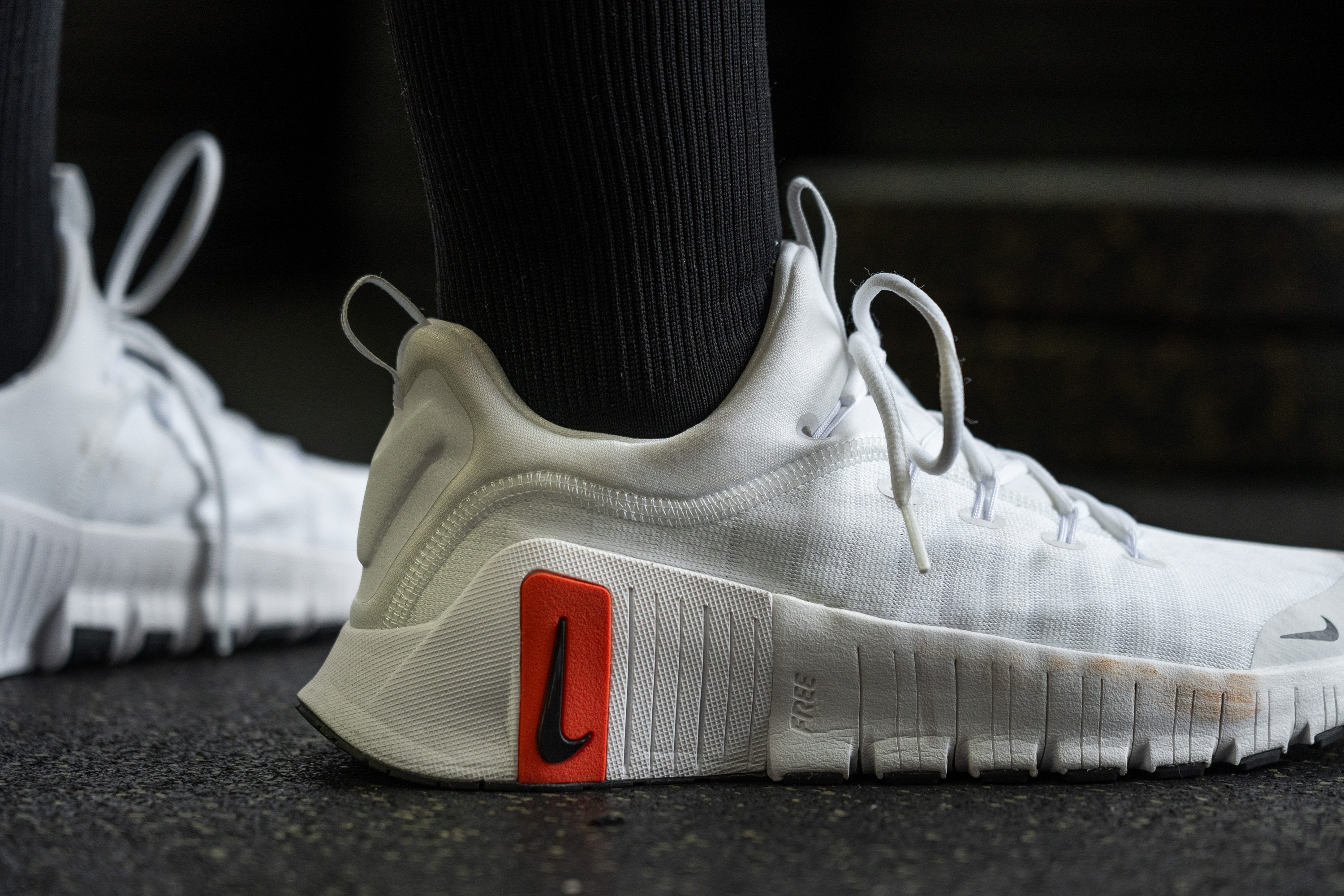
They did a great job preventing our heels from sliding too much inside the shoe. They also played a key role in keeping our rearfoot stable for weightlifting.
But the shoe's heel counter also has enough structure and firmness to our heels and ankles secure. On a 1-5 stiffness scale, we rated it with an average score of 3. No heel slips are to be reported on our end.
| Free Metcon 6 | 3 |
| Average | 2.7 |
Midsole width in the forefoot
Another core component of the shoe's stability is, of course, its platform width. And the Free Metcon 6 beats all the averages in this department!
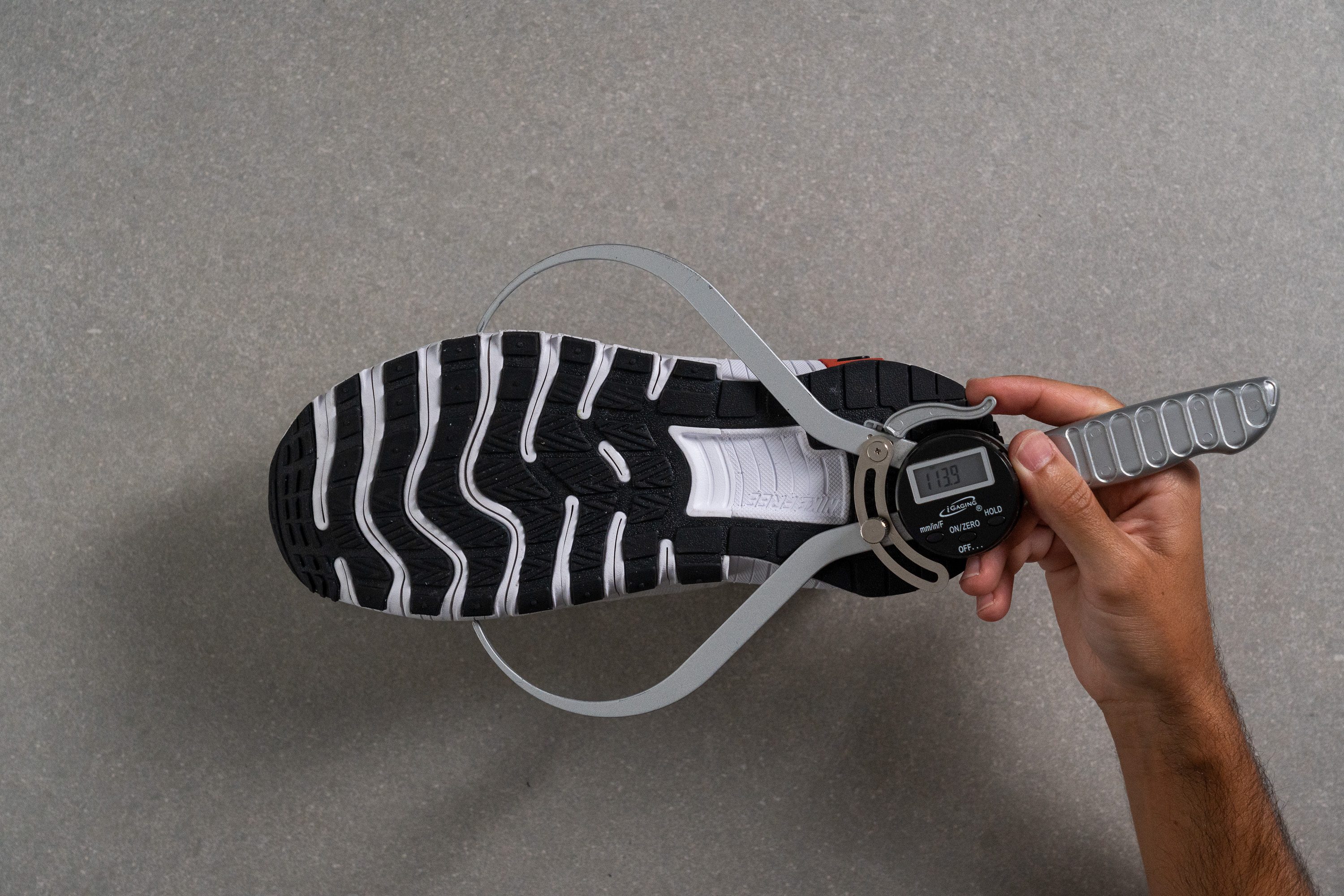
Our caliper showed 113.9 mm in the widest part of the shoe's forefoot. These extended contact points made our landings extra surefooted.
| Free Metcon 6 | 113.9 mm |
| Average | 110.3 mm |
Midsole width in the heel
In the heel portion of the shoe, we measured as much as 94.4 mm between the widest points of the sole!
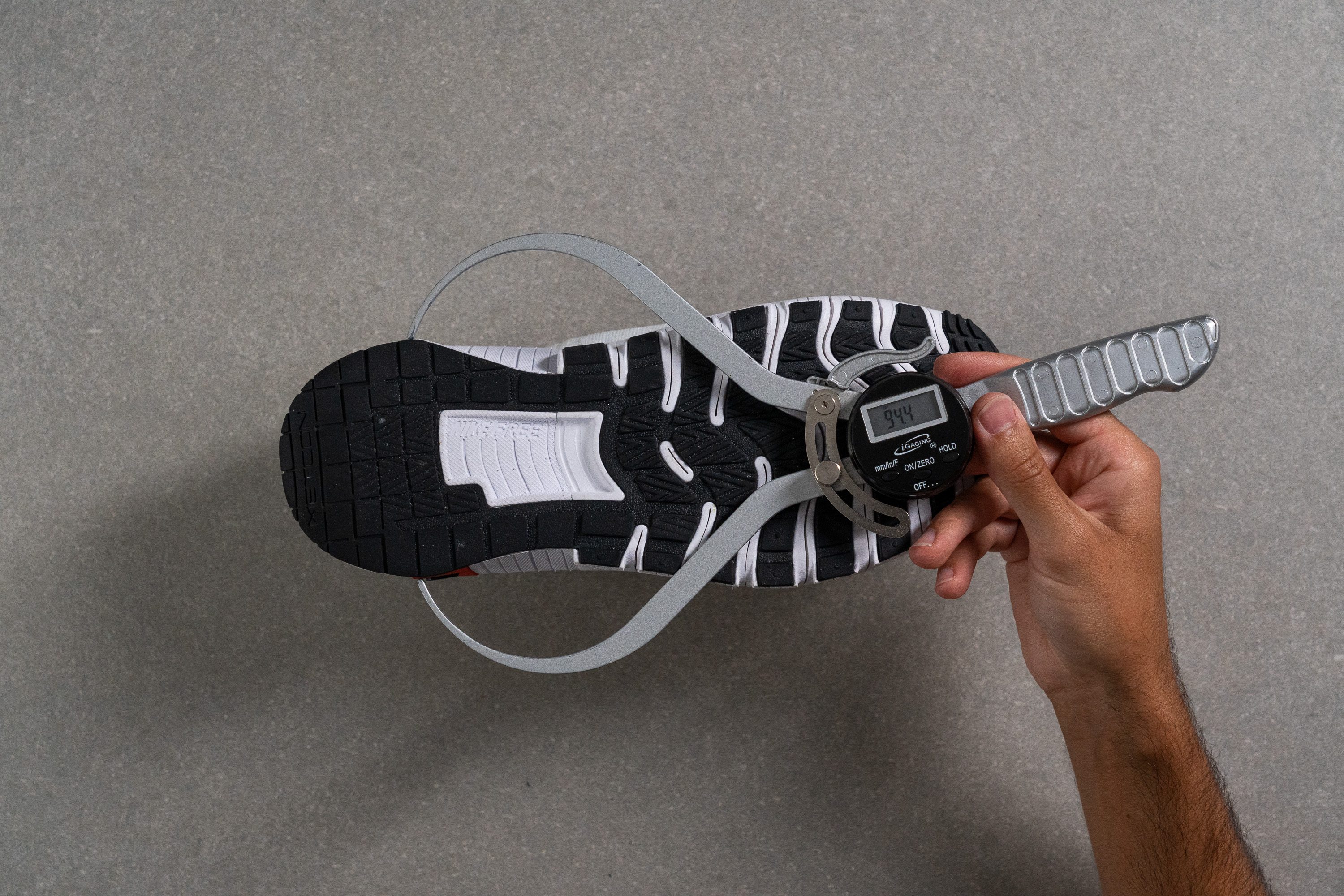
About 7 mm wider than average, it kept our wobbles at an all-time minimum!
| Free Metcon 6 | 94.4 mm |
| Average | 87.4 mm |
Flexibility
Stiffness
Bring in the podium because we've got a new flexibility champion over here! Our lab test confirmed it - the Nike Free Metcon 6 is officially the most flexible training shoe in our catalog!
According to our force gauge, it took the trainer as little as 4.3N to bend to a 90-degree angle. That is (get ready) 321% less than it takes on average!
With its laser-siped flex grooves, the Nike Free Metcon 6 is 102% more flexible than the Free Metcon 5 (8.7N) and 335% bendier than the Free Metcon 4 (18.7N).
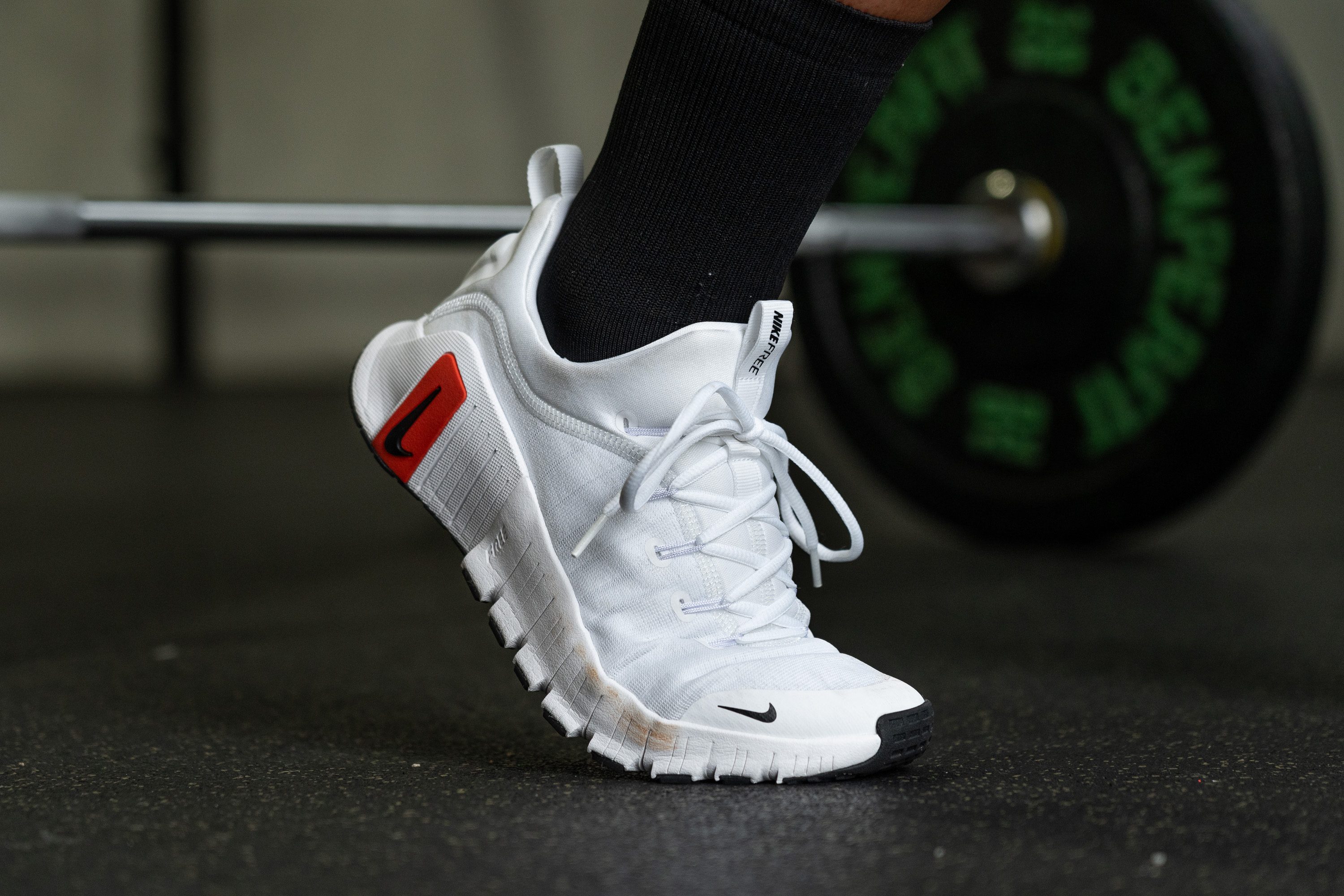
This gives the shoe a great edge for planks, lunges, burpees, rope jumps, sled pushes, and more exercises where foot bending in crucial.
| Free Metcon 6 | 4.3N |
| Average | 17.8N |
Size and fit
Internal length
You can confidently get the Nike Free Metcon in your regular US size. The trainer fits precisely on point in our men's US size 9.
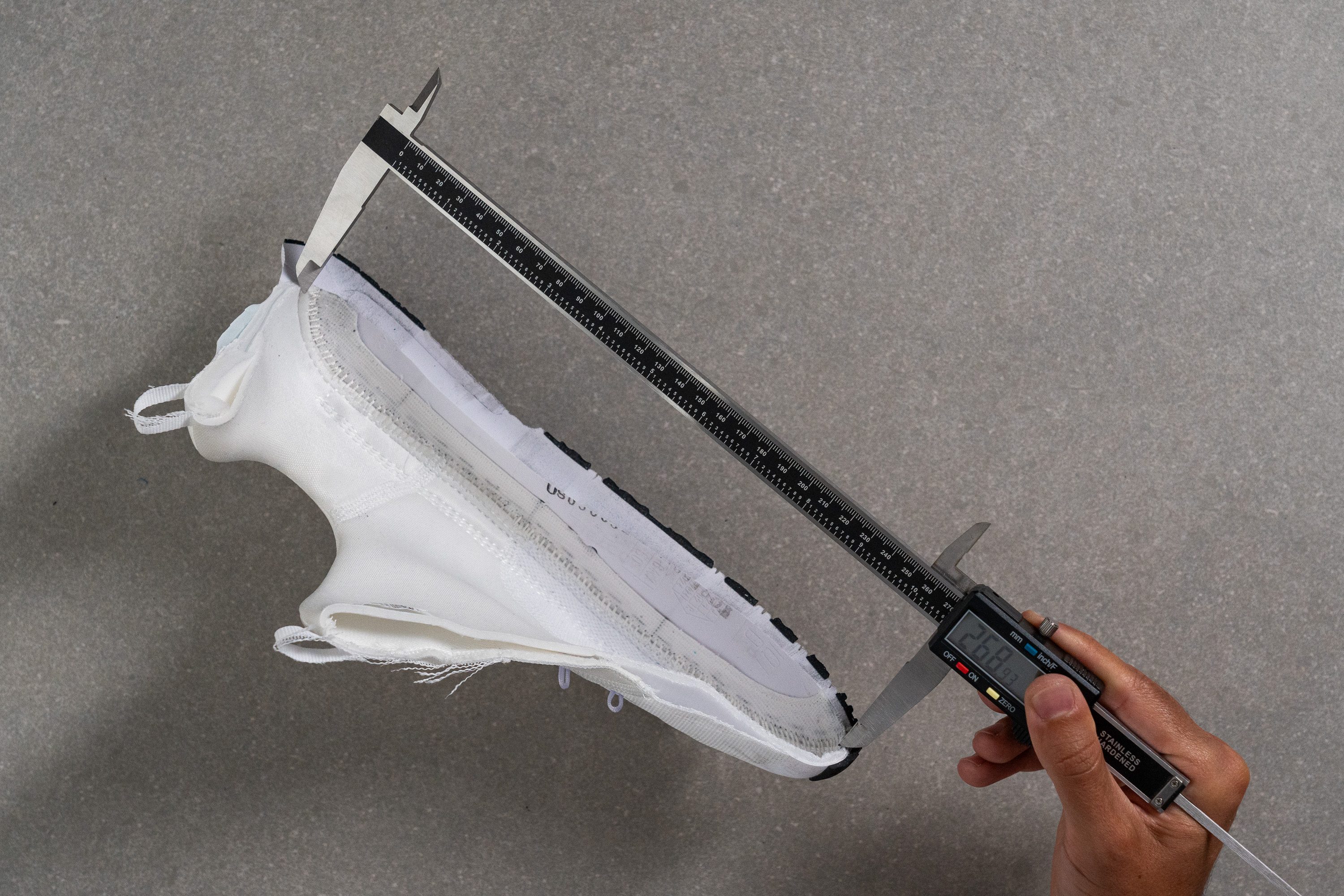
Our caliper measurement of 268.9 mm also confirmed that the shoe runs true to size.
| Free Metcon 6 | 268.9 mm |
| Average | 268.9 mm |
Toebox width at the widest part
The Free Metcon 6 is also a very wide-set trainer. We believe that athletes with both medium and wide feet will appreciate the extra toe room.
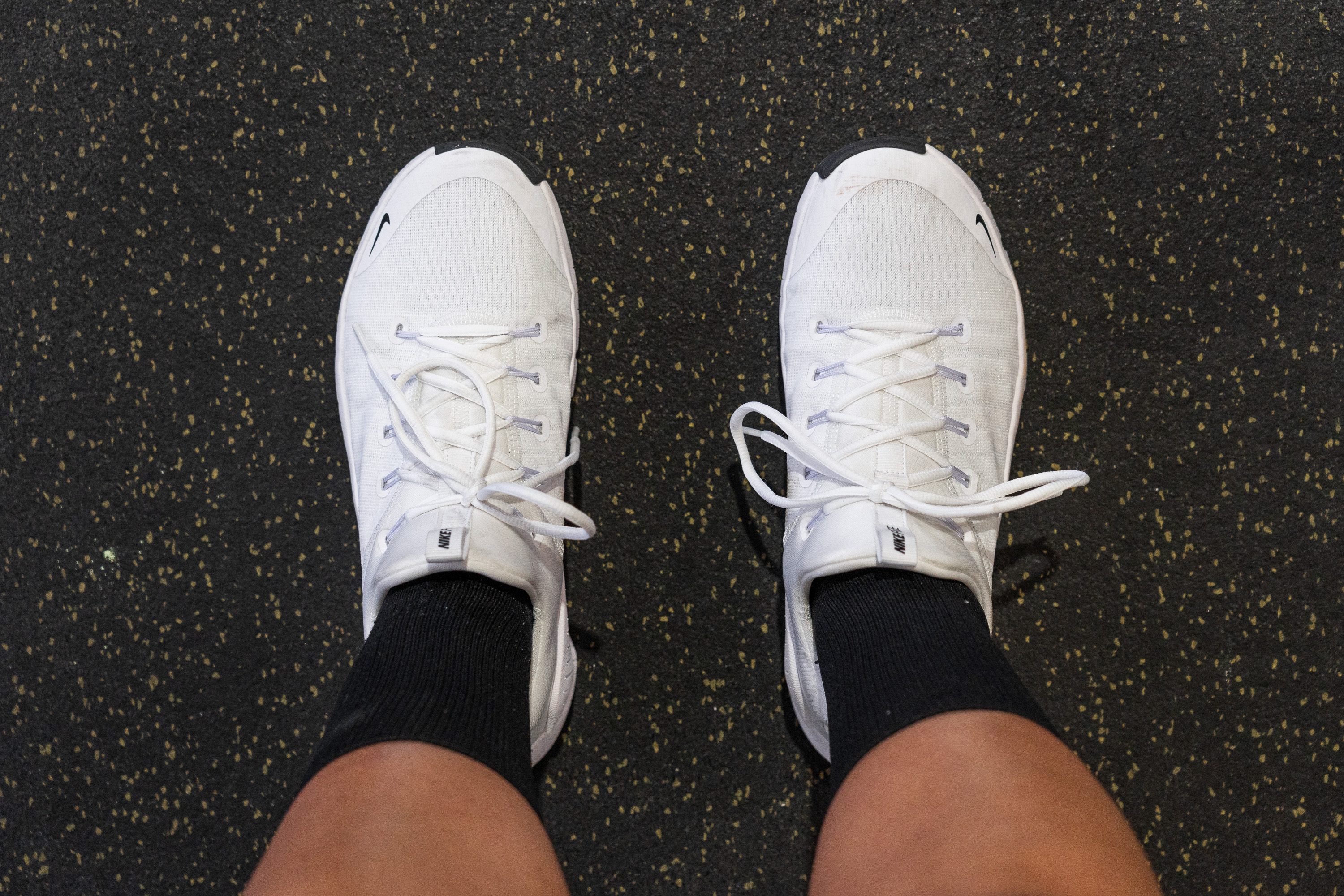
Measuring the widest part of the shoe's toebox, our caliper returned 108.5 mm which is a good 8(!) mm wider than average!
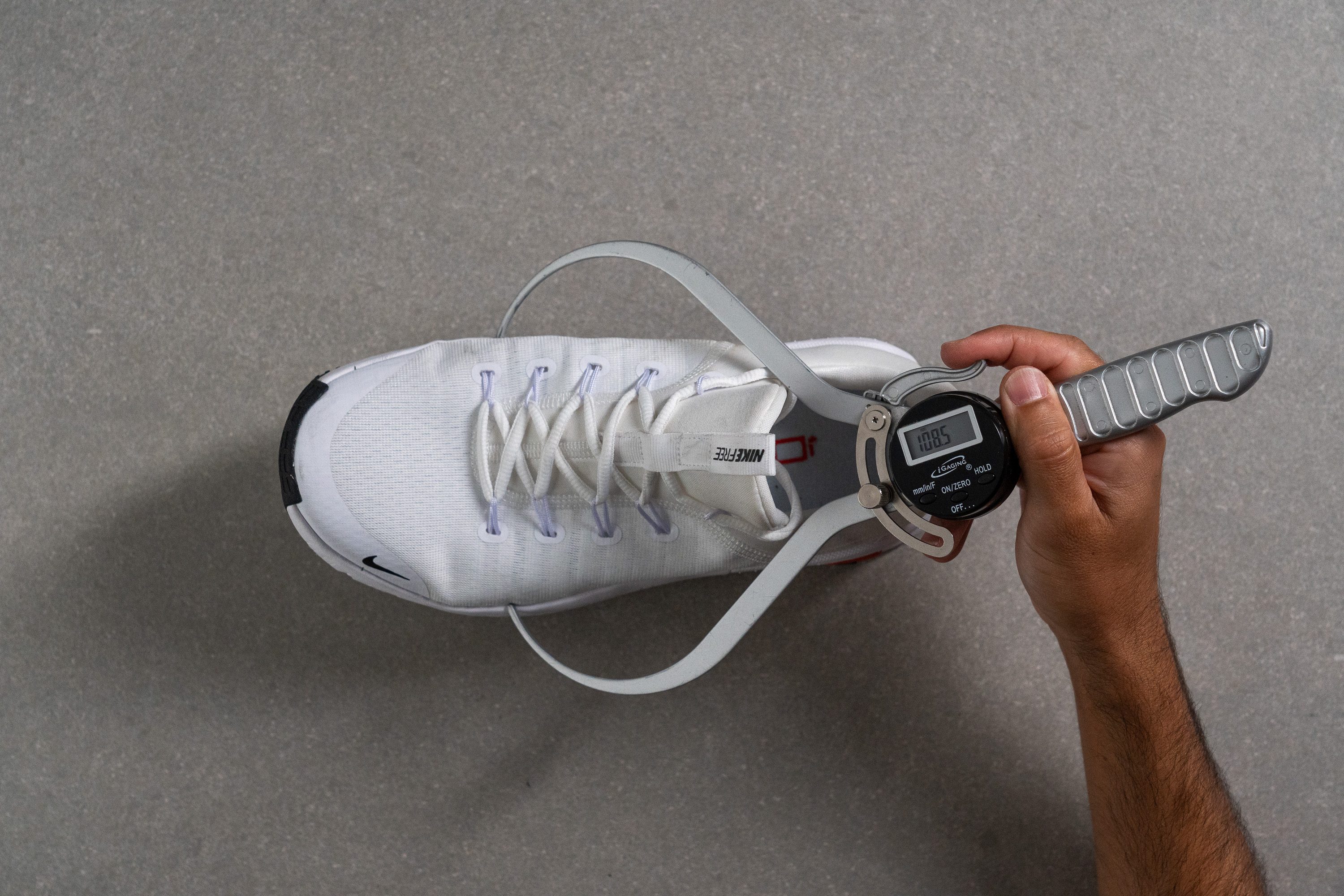
However, folks with narrow feet might need a more streamlined trainer to feel securely locked in for aggressive side-to-side movements. Perhaps the Nike Air Zoom TR 1 or the Nike Zoom Metcon Turbo 2.
| Free Metcon 6 | 108.5 mm |
| Average | 100.3 mm |
Toebox width at the big toe
The shoe's toebox remains wide even around the toe tips! Measuring its width at the point of the big toe, our caliper showed a wider-than-average reading of 80.7 mm.
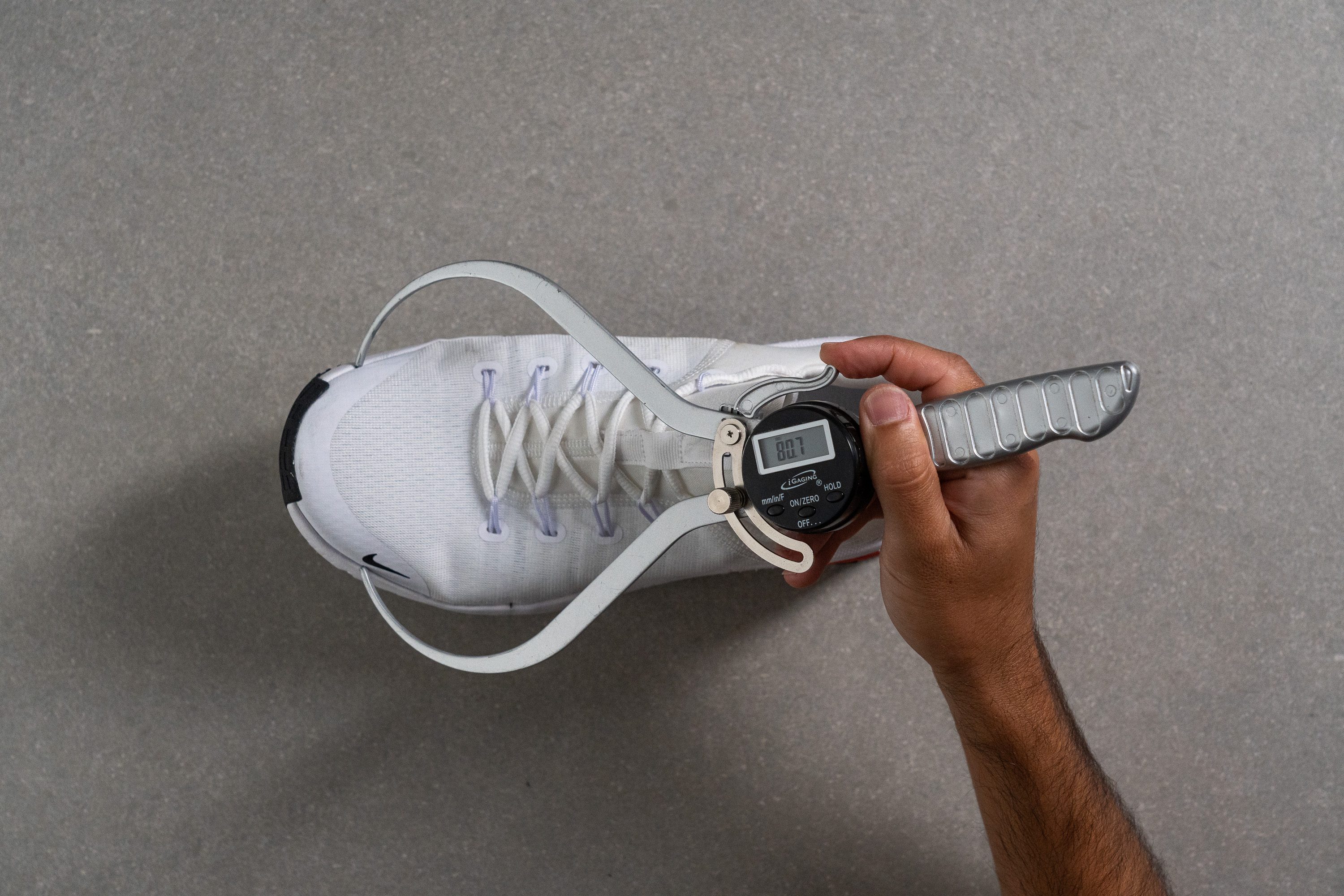
There is plenty of wiggle room to splay your toes and grab onto the gym floor like there is no tomorrow.
| Free Metcon 6 | 80.7 mm |
| Average | 78.3 mm |
Tongue: gusset type
Just like its predecessors, the Free Metcon v6 has a bootie-style upper where the tongue is not separated from the rest of the shoe.
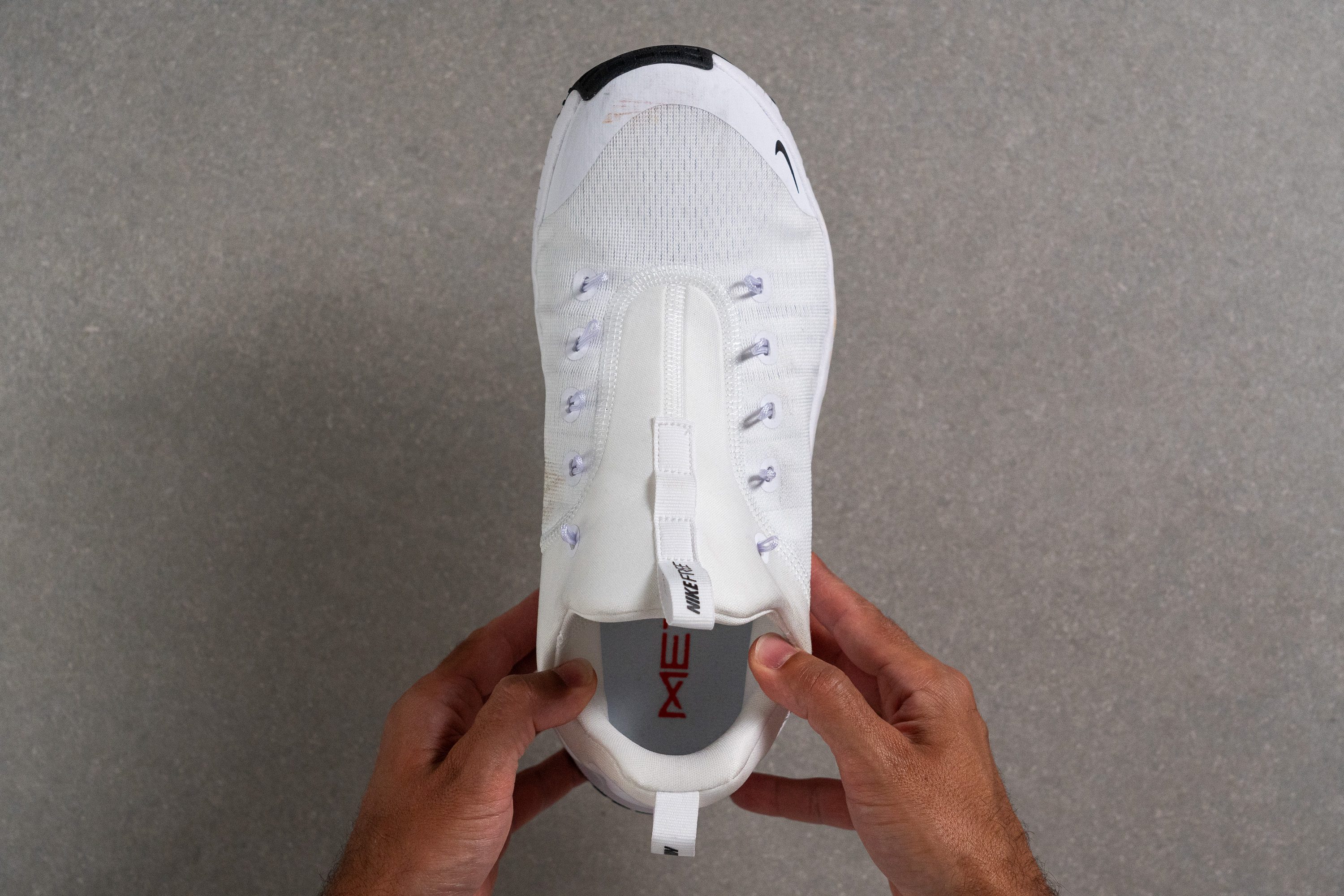
It creates a very cozy sock-like fit around the foot and ankle but we think that it can be a struggle to get on if you have wide or high-arched feet.
| Free Metcon 6 | Bootie |
Comfort
Tongue padding
Even though the shoe doesn't have a tongue as such, the upper still offers enough padding on top of the instep.
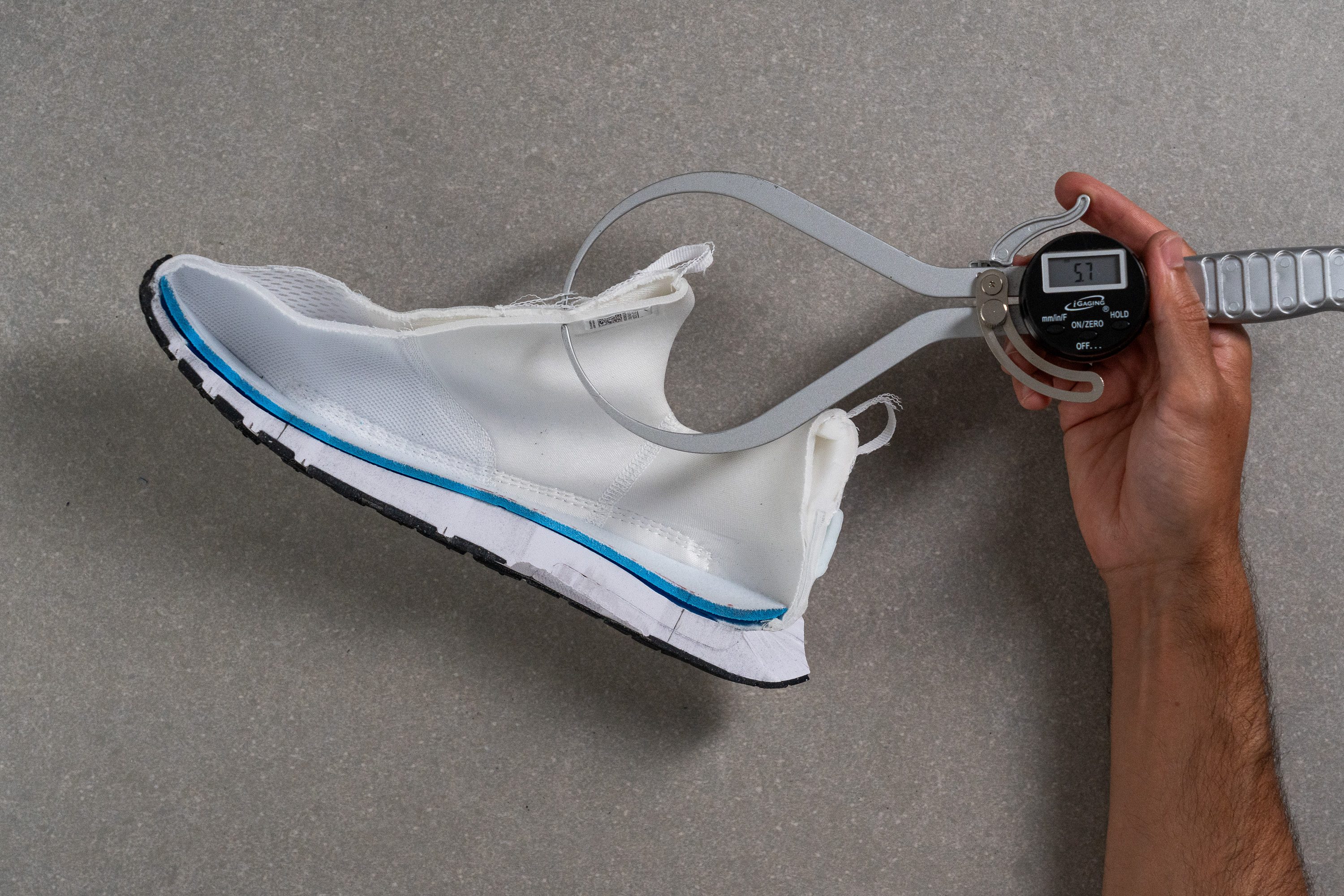
Our caliper showed 5.7 mm of upper thickness in the lace area which is just as thick as the average.
| Free Metcon 6 | 5.7 mm |
| Average | 5.4 mm |
Heel tab
Because the shoe's bootie upper can be tricky to put on, Nike added two handy finger loops both in front and at the back of the trainer.
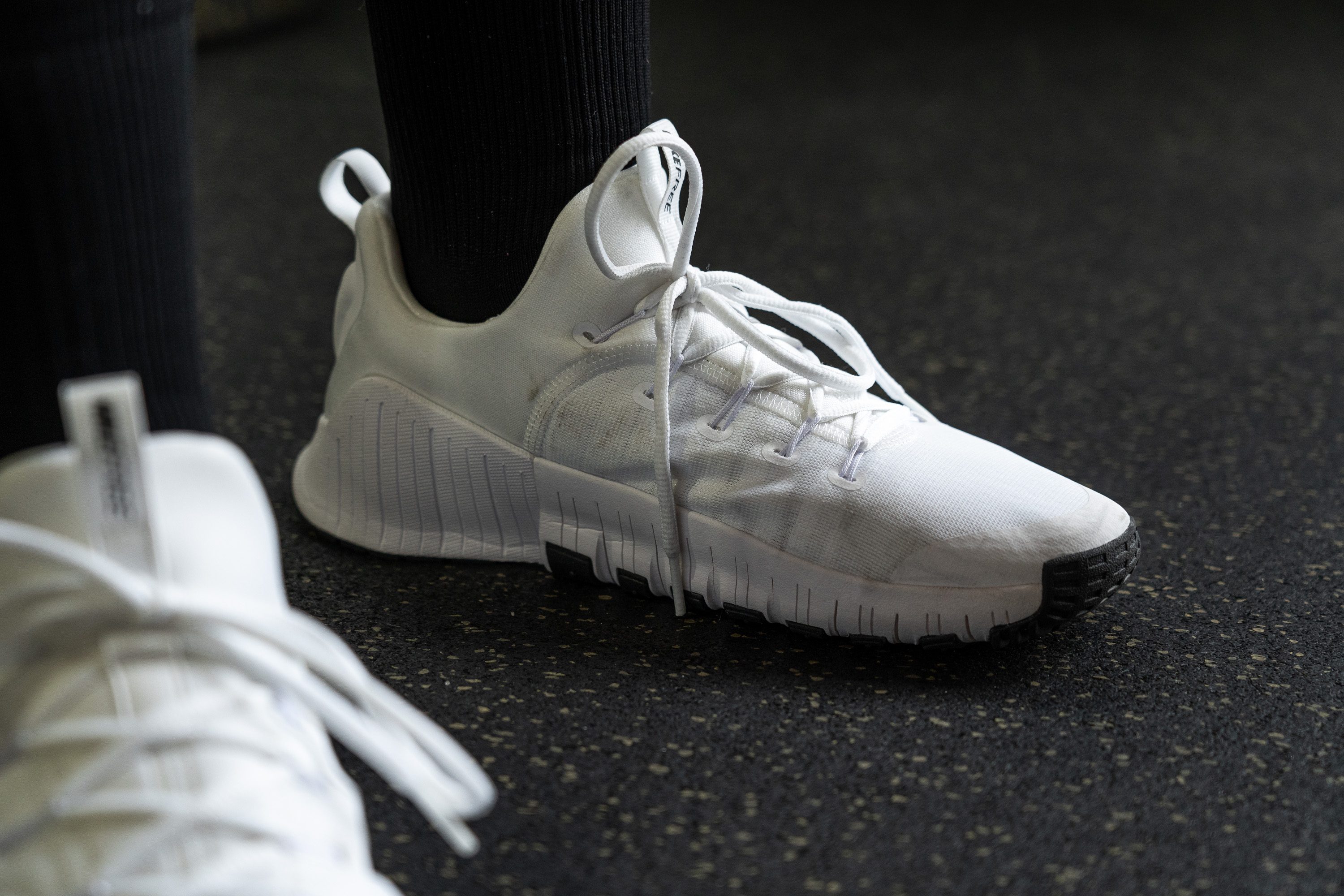
| Free Metcon 6 | Finger loop |
Removable insole
The insole of the Free Metcon 6 can be easily removed and swapped for a custom orthotic if needed. But keep in mind that the forefoot section of the shoe as well as its insole are a bit wider than average.
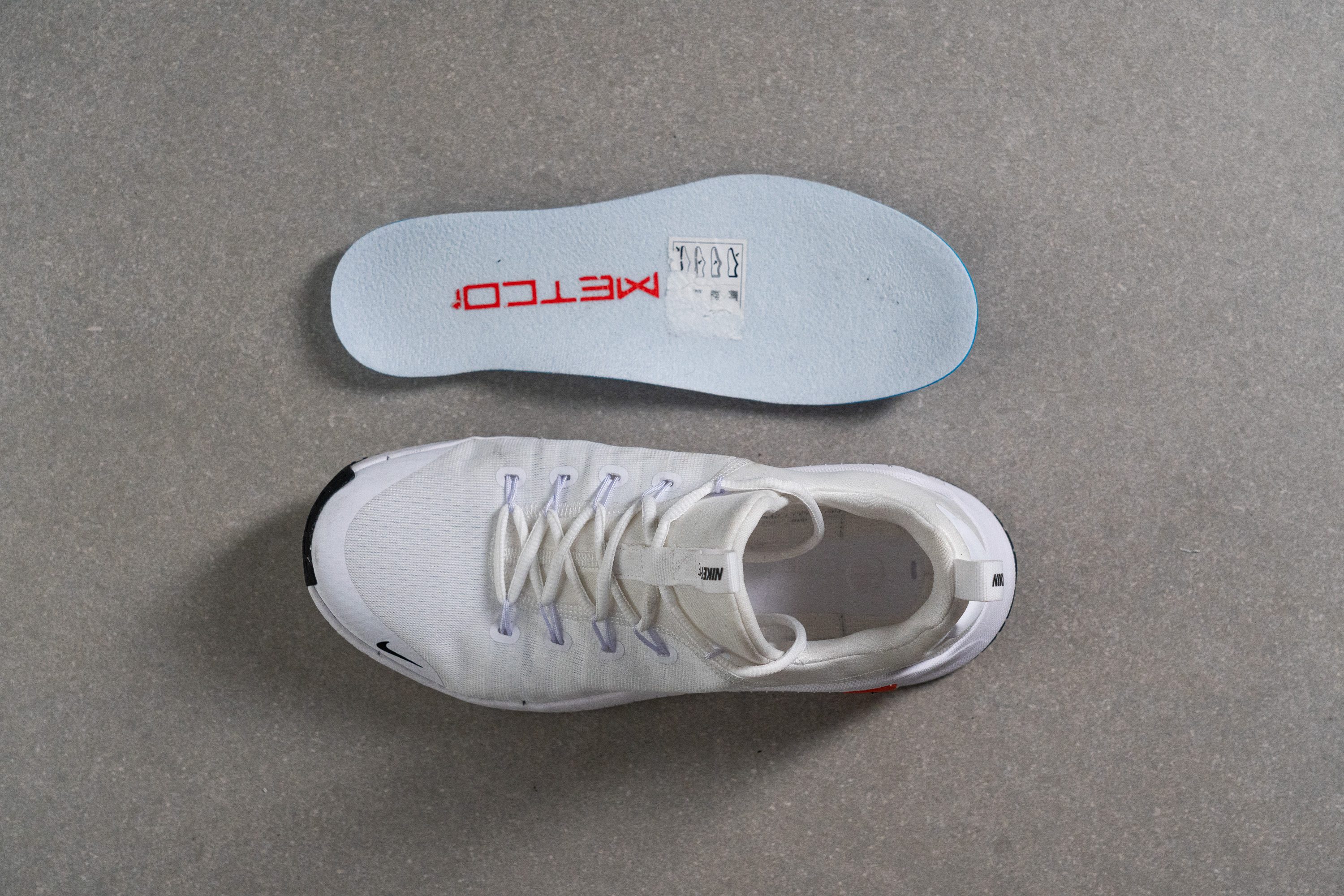
| Free Metcon 6 | Yes |

